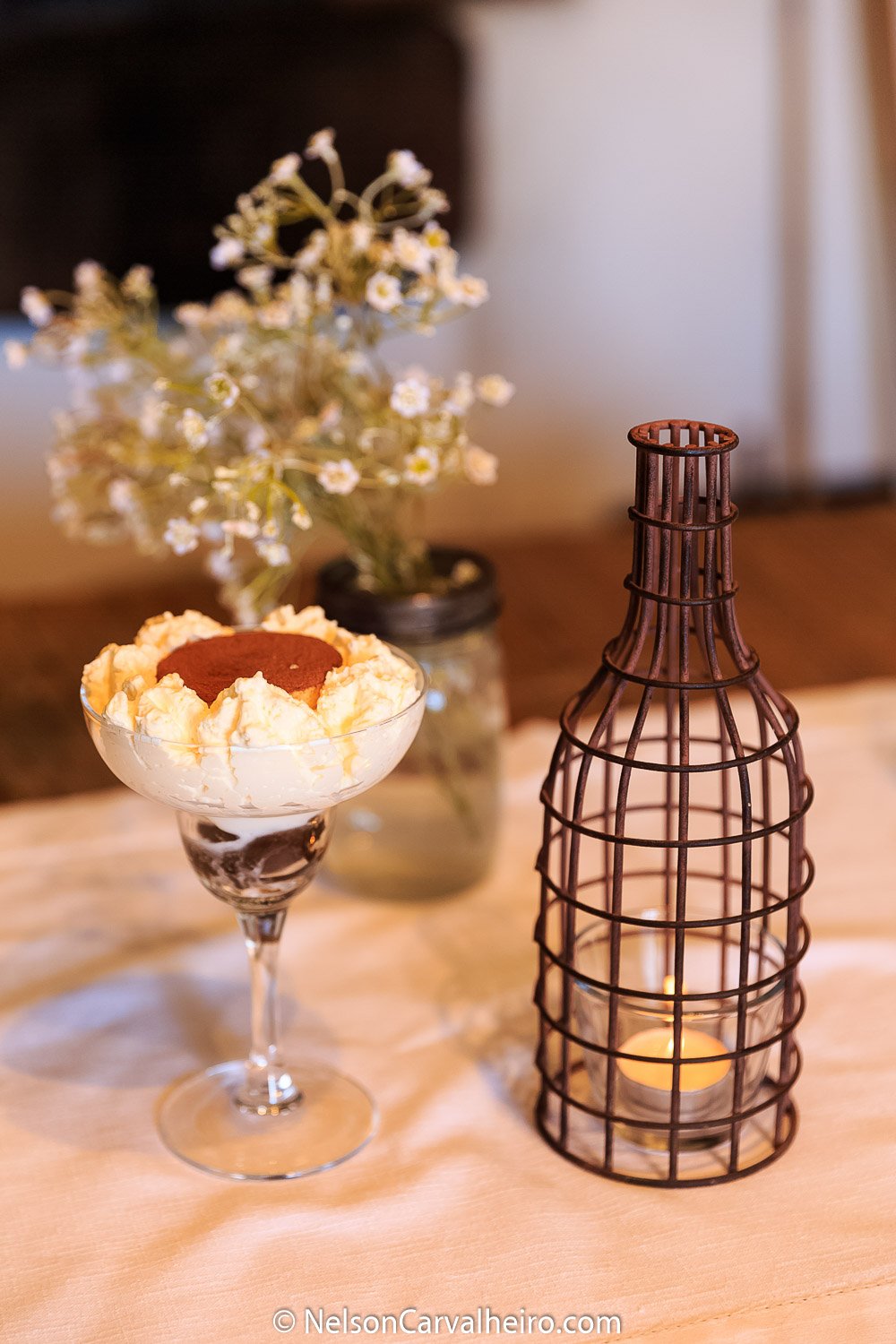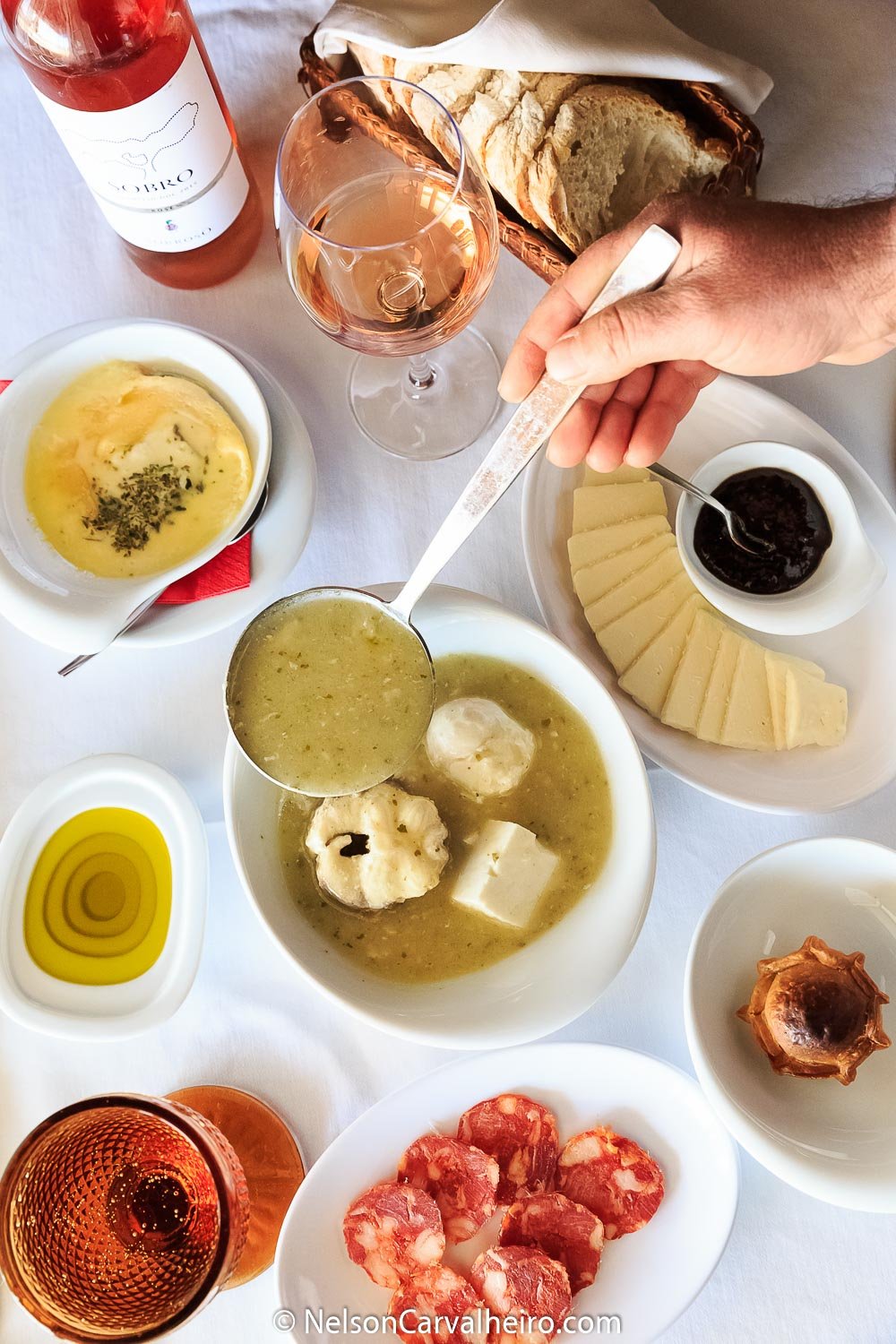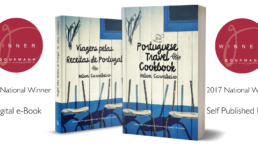During the first couple of weeks of April 2016, I was a guest of Wine Tourism in Portugal in the Alentejo to write de Alentejo Wine Travel Guide. My mission was to explore what the NY Times described as the “New Tuscany”, offering you the ultimate guide to traveling the Alentejo through its wine. In this guide, you will find recommendations for the best wine hotels, the best Restaurants, the Best Wineries, the Best Food&Wine experiences in the Alentejo. My probe into the Portuguese wine travel panorama has proven to be highly rewarding, as during the last year I have managed to gather some inside knowledge of what makes the Wine Tourism Business in Portugal tick. It all started with my Douro Valley Wine Travel Guide, where I explored the oldest and most beautiful wine region in the world. A few months later my 2016 the Year of Wine Tourism in Portugal post was coauthored with the most influential figures of the Wine Travel industry in Portugal.
The common word is one of major confidence and assurance that wine is increasingly becoming a major reason for influence when choosing Portugal as a destination, and in the word of Silvia Ferreira, the Founder of Wine Tourism in Portugal: “The requests for booking wine holidays are increasing every day. Portuguese wines are solidifying its reputation across the globe and this is leading wine lovers to want to explore this unknown country where it comes from. Portugal even made the cover of wine spectator. With a photo of Porto, my town. J”
@NCarvalheiro pic.twitter.com/2mwgEremFG
— Larry Englisby (@larryenglisby) June 22, 2015
(thank you to my friend @LarryEnglisby for sharing this cover with me almost 2 months before the magazine reached Portugal)
Alentejo Wine Travel Guide
Almost on par with the Douro, this acclaimed world fame of Portuguese wines is largely due to the wines originating from the Alentejo and its sub-regions. The terracotta land, tied with the almost ever-present sunshine, lends the wines from the Alentejo a rich, smooth and round feel on the palate, making them easier to drink when compared to other Portuguese counterparts. Namely the wines from the Douro, wich have more minerals and acidity, largely due to the most inhospitable terroir where wine can be grown. Or even the Baga wines from the Bairrada region, which have so much tannin they have been dubbed the Portuguese Barolos and Barbarescos, reaching life spans of over 40 years.
 In the Alentejo everything is easier: the land is flat, there is plenty of space, the temperature ranges are mellower, you can (have to) irrigate the grapes (it is forbidden by law in the Douro Valley). What does this all amount to The Alentejo produces wines which are on par with the palate of Wine Guru Robert Parker and Bordeaux Doctrine of making bold, full-bodied wines advocated by Mr. Michel Rolland. (Side note: check out the Anti- globalization of wine taste documentary Mondovino). This appeal to the masses has earned it a place in the top pics at restaurants and wineries all across the globe, rivaling wines from established regions from the old and new world.
In the Alentejo everything is easier: the land is flat, there is plenty of space, the temperature ranges are mellower, you can (have to) irrigate the grapes (it is forbidden by law in the Douro Valley). What does this all amount to The Alentejo produces wines which are on par with the palate of Wine Guru Robert Parker and Bordeaux Doctrine of making bold, full-bodied wines advocated by Mr. Michel Rolland. (Side note: check out the Anti- globalization of wine taste documentary Mondovino). This appeal to the masses has earned it a place in the top pics at restaurants and wineries all across the globe, rivaling wines from established regions from the old and new world.
 Contrary to what happens in the Douro Valley, which only uses Portuguese autochthonous grapes, wine producers in the Alentejo grow an enormous plethora of grape varieties from all over the world, in addition to the Portuguese varieties. Syrah, Cabernet sauvignon, Merlot, NeroD’avola, Malbec, Sangiovese, Sauvignon Blan, Pettit Verdot, Pinot Grigio… find prosperous terrain in the Alentejo and further aid in the international likability and reach of this region. It is very easy to ask for in a bodega in London for a Syrah or a Chablis, and a bit more difficult to ask for a Rabigato or a Tinto Cão, or any other of the +500 autochthonous Portuguese grape varieties. So, if you like wines with character, intense aromas and which give you a mouthful, then Alentejo is your place and this Alentejo Wine Travel Guide an essential piece of information when touring Portugal for its wine.
Contrary to what happens in the Douro Valley, which only uses Portuguese autochthonous grapes, wine producers in the Alentejo grow an enormous plethora of grape varieties from all over the world, in addition to the Portuguese varieties. Syrah, Cabernet sauvignon, Merlot, NeroD’avola, Malbec, Sangiovese, Sauvignon Blan, Pettit Verdot, Pinot Grigio… find prosperous terrain in the Alentejo and further aid in the international likability and reach of this region. It is very easy to ask for in a bodega in London for a Syrah or a Chablis, and a bit more difficult to ask for a Rabigato or a Tinto Cão, or any other of the +500 autochthonous Portuguese grape varieties. So, if you like wines with character, intense aromas and which give you a mouthful, then Alentejo is your place and this Alentejo Wine Travel Guide an essential piece of information when touring Portugal for its wine.

Alentejo Wine = Alentejo Way of Life
The upside is that, instead following a recipe, the Alentejo has its own way of doing wine. A slow and very personal way, one that is distinct from producer to producer, adding that extra layer of unique personality to the Wines of Alentejo, which so many other international wines fundamentally lack. And it is here that the Alentejo wines and its territory define itself: people who love their land, chubby, rounded figures, who live by the rule of bold, deep and meaningful flavors, who only eat from local restaurants, regional cuisine, and who seek to transmit as much of this Alentejo and Portugal feeling into its wines.
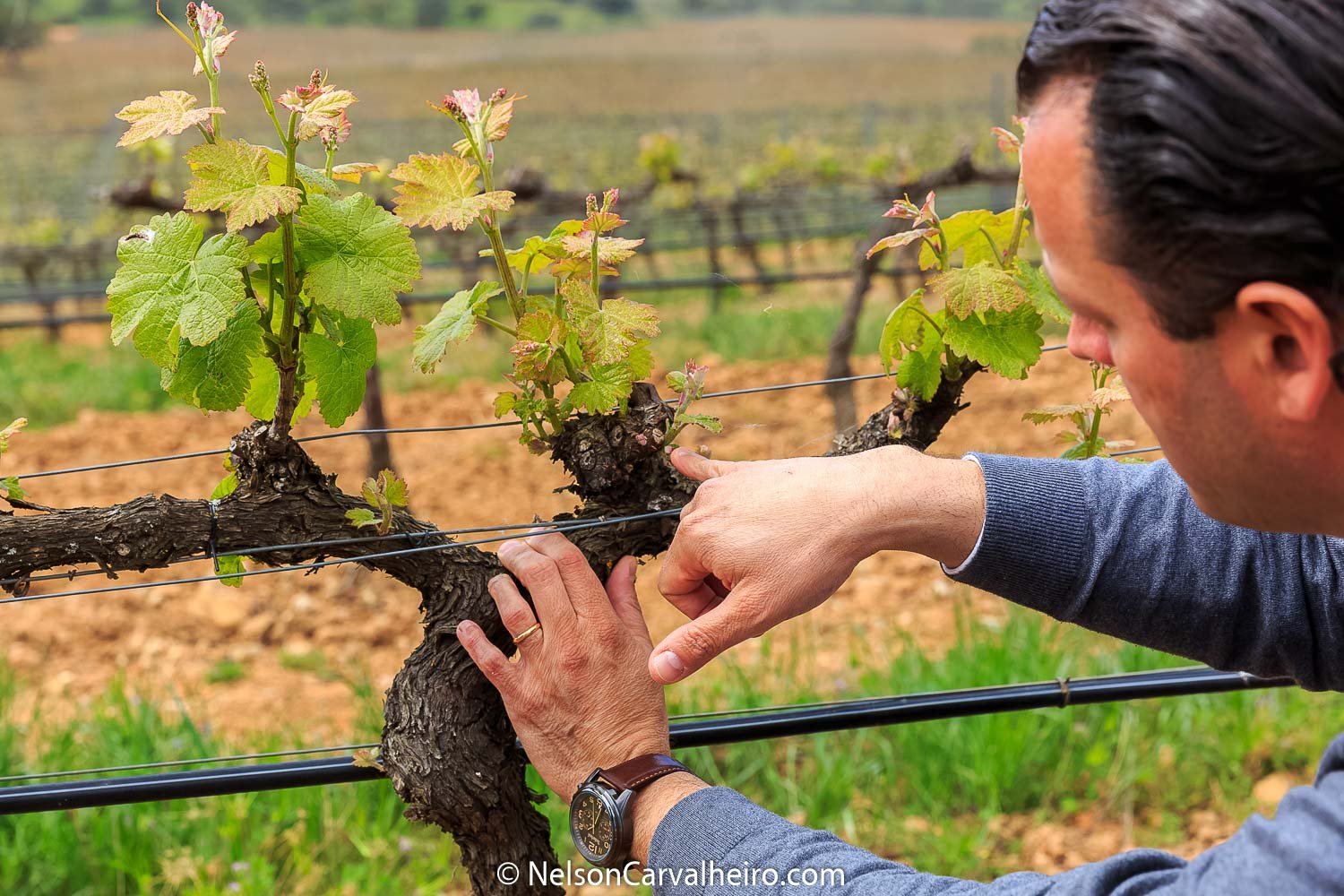 You see the solitude of the long plains of the Alentejo territory, the relative distance to the capital makes it an isolated part of Portugal, and this isolation leaves time for people to think about their life, during the waiting periods, or during the long drives from place to place. There is no need to constantly fill your life with something, there is no want to feel the “buzz” around you. It is a place for peace, for quietness and reflection, and this is translated into the wines. There is patience, virtue, time. In the Alentejo wines, nothing is rushed, everything takes its time. There is time to breathe. It’s natural! They have time to seek, to experiment to enjoy.
You see the solitude of the long plains of the Alentejo territory, the relative distance to the capital makes it an isolated part of Portugal, and this isolation leaves time for people to think about their life, during the waiting periods, or during the long drives from place to place. There is no need to constantly fill your life with something, there is no want to feel the “buzz” around you. It is a place for peace, for quietness and reflection, and this is translated into the wines. There is patience, virtue, time. In the Alentejo wines, nothing is rushed, everything takes its time. There is time to breathe. It’s natural! They have time to seek, to experiment to enjoy.
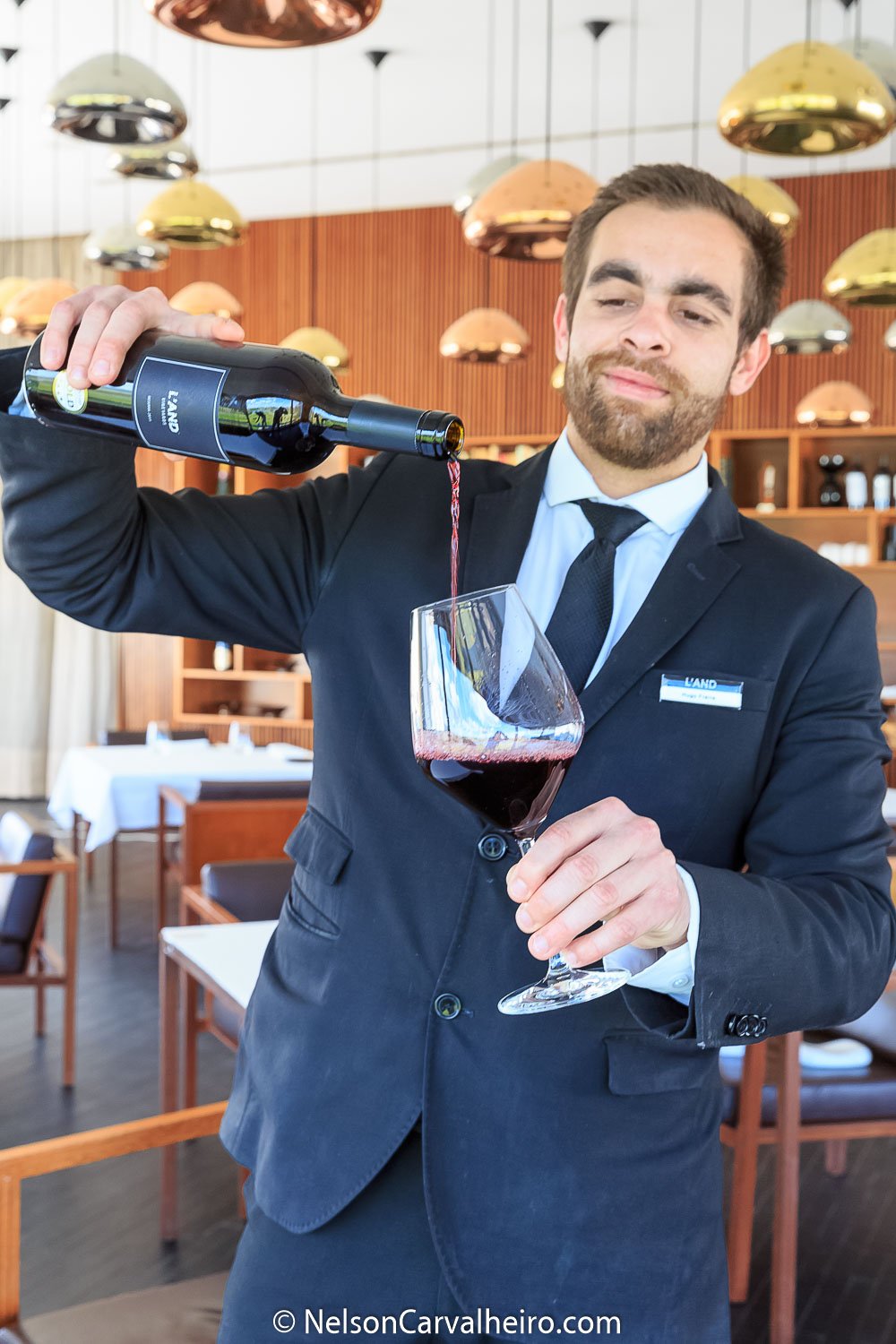
A vintage past which is very present in everyday life. They look at things in a different way, there is respect for the way life is, no one is trying to rush it. And of course, like in the way that the wine maker’s life their life, this wine also establishes a deep and meaningful relation with you when its drank. Its aroma and flavors linger around in the palate making you experience several levels and layers of character. These are wife wines, not one-night stand wines. What is especially nice about wine traveling in the Alentejo is that all the crowds are in Napa, Bordeaux, Tuscany, and Rioja, not in the Alentejo and this is worth GOLD!
Driving Though the Alentejo
Endless straight lines and roads, regardless if you are on the motorway or on the back roads, there is just one direction. Forward. Also very little traffic. It’s just straight, strait, strait. If you are on the motorway, there is almost no police. I can honestly say that I did not see any during my 5 days in Alentejo. It’s fairly safe to drive at 160, 170, 180 km/h , especially if you are German and are used to the limitless of the Autobahn. Plus, the scenery is much nicer, as this journey was made in April 2016, at the peak of spring, so it was a never-ending horizon of green and blue. Normally, and the staple image of the Alentejo is one of terracotta hills, lending the idea that this land is quite dry. This may be so in Summer, but as you can see from the photos, spring makes all the difference. Hot Tip: Tune into local Radio Stations, for some local heartfelt soundtrack to your visit.
 Spring in the Alentejo
Spring in the Alentejo
The vines are just starting to sprout, so the photos do not feature the lush green vineyards that one will find in June and July – Like I did for my Douro Valley wine Travel Guide. Regardless, there was no rain in these days, and temperatures averaged 21ºC with highs of 26 and lows of 11. In the summer is just scorching heat and the least commendable time to visit the Alentejo. Tasting wine when jumping from aircon to aircon is a recipe for disaster. Aim for the sweet spot of late May and June, or join in on the festivities of the harvest in September. In autumn and winter, there is a lot of rain, and the vines are bare, so the landscape loses some of its charms. There is one upside though to winter traveling through the Alentejo. You will most probably be the only foreigner around. Somewhat of a dream if you ask me.
 Alentejo Wine Travelling = Alentejo Food Travelling
Alentejo Wine Travelling = Alentejo Food Travelling
You see, what makes the Alentejo such a unique place is that life revolves around food and wine. These are the two major priorities life. Well, maybe a third. Companionship! Nothing else matters. The best that the Alentejo has to offer is the connection of food and wine. It’s not just that is comparable to Tuscany, it puts the region right up there with other great gastronomical destinations in the world. I was lucky to have found the Alentejo just on the breaking point of the mini food Food&Wine revolution, where it is no longer just the old ladies who have cooked all their life and hold all the secrets to the cuisine of the Alentejo. A new breed of young male chefs is making their name heard across the territory and across the Portuguese food scene.
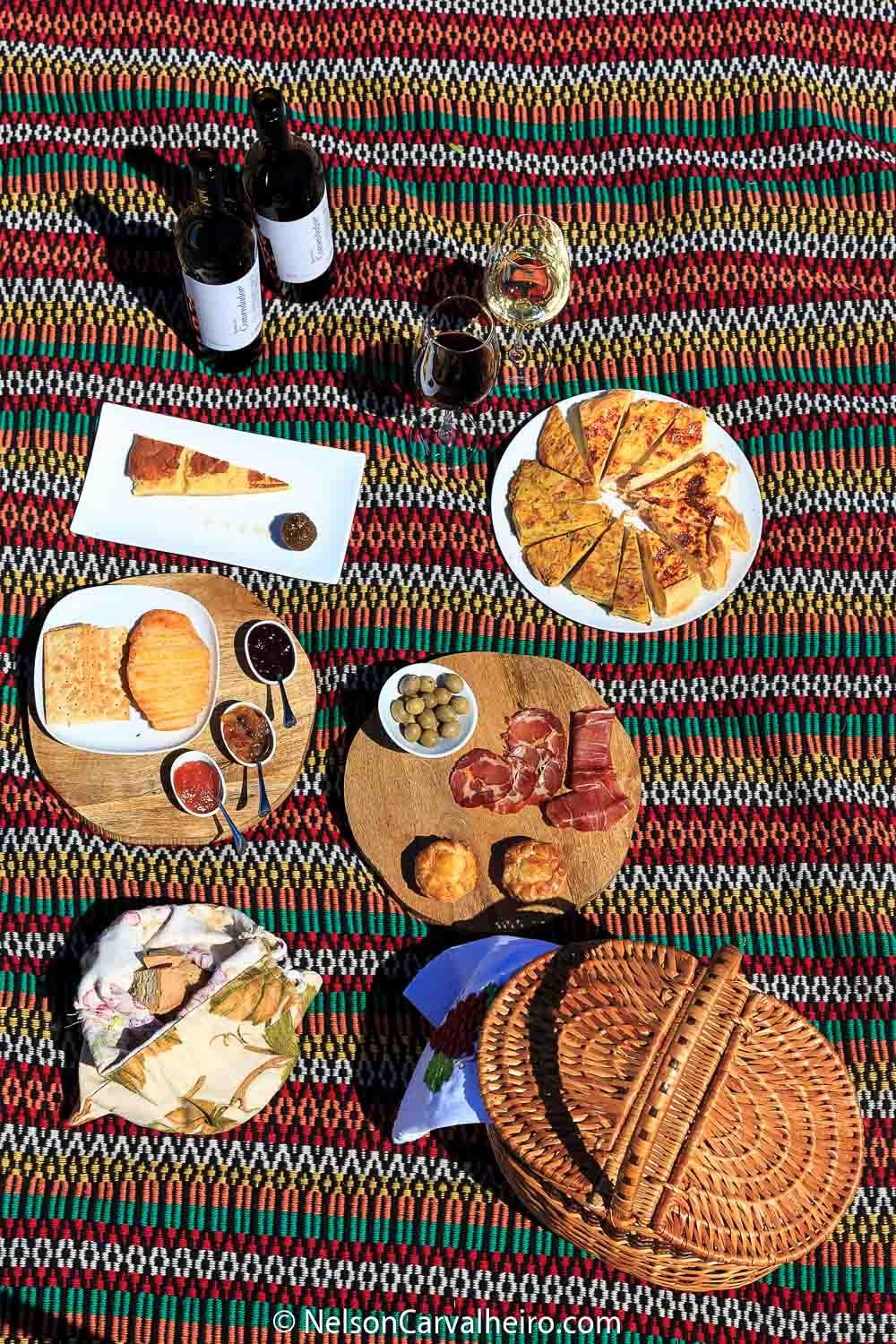
 It right at this very moment that the Alentejo is starting to define itself to as a must go to place in food and wine travel panorama. Until now it was up and conning, but from this year onwards it has become a must visit location. The whole idea of the revamp which the Alentejo gastronomy is going through is based on the idea that the food from the poor has become fashionable and interest. Old recipes based on the idea of taking the most of what every product would give you have sparked splendid creations, some making its way to Michelin Star quality. But I don’t want to reveal too much too soon. As with the experience that I had traveling and writing this Alentejo Wine Travel guide, I took my time into making sure that my content was wholesome and truthful to that the Alentejo represents to the avid wine Tourism traveler. As with my previous posts, I have broken the Alentejo Wine Travel Guide into sections so you can better navigate to what interests you the most:
It right at this very moment that the Alentejo is starting to define itself to as a must go to place in food and wine travel panorama. Until now it was up and conning, but from this year onwards it has become a must visit location. The whole idea of the revamp which the Alentejo gastronomy is going through is based on the idea that the food from the poor has become fashionable and interest. Old recipes based on the idea of taking the most of what every product would give you have sparked splendid creations, some making its way to Michelin Star quality. But I don’t want to reveal too much too soon. As with the experience that I had traveling and writing this Alentejo Wine Travel guide, I took my time into making sure that my content was wholesome and truthful to that the Alentejo represents to the avid wine Tourism traveler. As with my previous posts, I have broken the Alentejo Wine Travel Guide into sections so you can better navigate to what interests you the most:
Alentejo Best Wine&Food Experiences
Alentejo Best Wine Hotels
A number of boutique hotels have sprouted out in the last 5 years helping to cement the region as on par with other established wine destinations like La Rioja, Bordeaux or Tuscany. It is always fantastic to see how well this was made where the local entities and culture, design products and heritage were always present when these boutique and special hotels were built. I am listing the best ones here, but you can seek a unique wine hotels at the Wine Tourism in Portugal booking portal. As I mention in my Best Wine Hotels in Portugal Post “Can you imagine what it is like to wake on the top of a mountain overlooking the Douro valley and seeing how the river serpents its way around the lush green footsteps of vineyards? The air is pure and healthy; a cloud dangles mid height like a loaf of cotton pinned on the opposite hill. Ahead of you is a day of Portuguese Wine discovery, always accompanied by quaint and candid Portuguese traditional cuisine. Having the opportunity to speak with the Vineyard’s owners and meeting the simple people that make some of the world’s finest wines. Maybe even taking part in stepping on some grapes, if you are bold enough. I know that I will be making my own wine!”
For other hotel option in the Alentejo, you can use the Wine Tourism in Portugal Hotel search tool.
L’AND Vineyards Hotel
L’AND Vineyards is a part of only a hand full of luxury full-service 5-star properties in Portugal which were designed and built around wine. The big difference is that, unlike The Yeatman Hotel, the Douro Vintage Hotel, and The Vine Hotel, this one actually has vineyards around it, and has the cellar amidst its main building.
(Note: I purposely left out other wine hotels which I love, like Quinta da Pacheca, out of this statement as they are not full-service 5-star properties.)
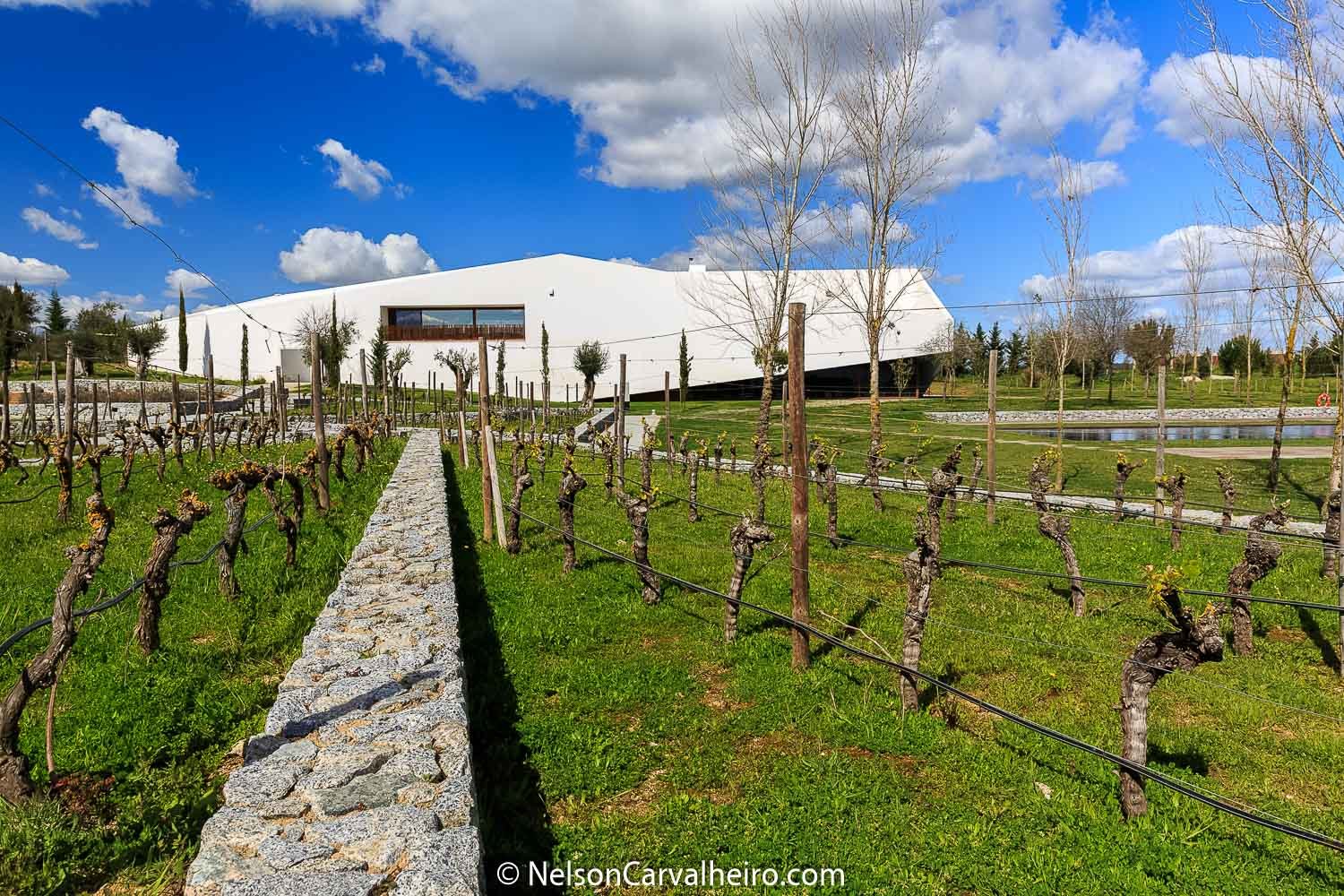
 So, very in a very truthful manner, L’AND Vineyards is a “Wine Resort” that offers a unique rural experience in an exclusive and contemporary ambiance. Looking at the photos, one would think that L’AND is set in a far way vineyard, one that takes hours on back roads to be reached. Actually, it is just under an hour’s drive from Lisbon airport. As you come off the A6 motorway and make your way to Montemor-o-Novo, you will begin to see a gated and protected vineyard. It is within this secluded landscape that L’AND charms its guests. The drive from the gate to the main building takes a couple of minutes, and here is where you can witness this “life within the vineyard” feeling that L’AND works so hard to portray. The central building is a design spaceship, surrounded by a lake (used to water the gardens and vineyards) and the outside deep blue tiled pool. Two water features which offer plenty of water mirror photo opportunities. Besides housing the winery, the “mothership” houses the reception, library, the restaurant, the spa and the indoor heated pool. I personally liked the opening within the front desk overlooking the fermentation tanks in the middle of the building. A sight best enjoyed when they are being used during the harvest.
So, very in a very truthful manner, L’AND Vineyards is a “Wine Resort” that offers a unique rural experience in an exclusive and contemporary ambiance. Looking at the photos, one would think that L’AND is set in a far way vineyard, one that takes hours on back roads to be reached. Actually, it is just under an hour’s drive from Lisbon airport. As you come off the A6 motorway and make your way to Montemor-o-Novo, you will begin to see a gated and protected vineyard. It is within this secluded landscape that L’AND charms its guests. The drive from the gate to the main building takes a couple of minutes, and here is where you can witness this “life within the vineyard” feeling that L’AND works so hard to portray. The central building is a design spaceship, surrounded by a lake (used to water the gardens and vineyards) and the outside deep blue tiled pool. Two water features which offer plenty of water mirror photo opportunities. Besides housing the winery, the “mothership” houses the reception, library, the restaurant, the spa and the indoor heated pool. I personally liked the opening within the front desk overlooking the fermentation tanks in the middle of the building. A sight best enjoyed when they are being used during the harvest.
The L’AND Sky Suites
Besides the L’AND Restaurant, the best thing about the L’AND Vineyards hotel is the sky suites. These are detached from the main building, so there is no noises or confusion to hassle your down time. Plus, you get a bit of a walk through the vineyards on your way to dinner, breakfast or to a vinotherapy massage like the one I had. They are called Sky Suites because they give you the impression of sleeping “under the stars” when you open on the bedroom’s ceiling. I can vouch, for the spectacularly of this feature, but please be patient. It takes the human eye about one hour to adjust to complete darkness, so be a little patient and you will eventually see some starts. Something easier said than done after you have tasted wine all day long like I have.

 I stayed in Sky Suite 6, being told by Daniella from the Front Office that it was the best one, so if you read this, please ask for this particular suite. This suite has over 120 sqm, a private patio with a heated plunge pool. The entrance to the suite also features the most magnificent climbing Jasmin and an outside fireplace which can be lit from the harvest, all the way through spring. The interiors were designed by the architect Marcio Kogan and are made of slate natural stone and wood, ornamented with a set of art pieces and exclusive furniture and fabrics. I can tell you that the design of the rooms, does not compromise for one single bit its comfort, with me not having to fuss around with the pillow to be able to sleep the standing proof of this acclamation.
I stayed in Sky Suite 6, being told by Daniella from the Front Office that it was the best one, so if you read this, please ask for this particular suite. This suite has over 120 sqm, a private patio with a heated plunge pool. The entrance to the suite also features the most magnificent climbing Jasmin and an outside fireplace which can be lit from the harvest, all the way through spring. The interiors were designed by the architect Marcio Kogan and are made of slate natural stone and wood, ornamented with a set of art pieces and exclusive furniture and fabrics. I can tell you that the design of the rooms, does not compromise for one single bit its comfort, with me not having to fuss around with the pillow to be able to sleep the standing proof of this acclamation.
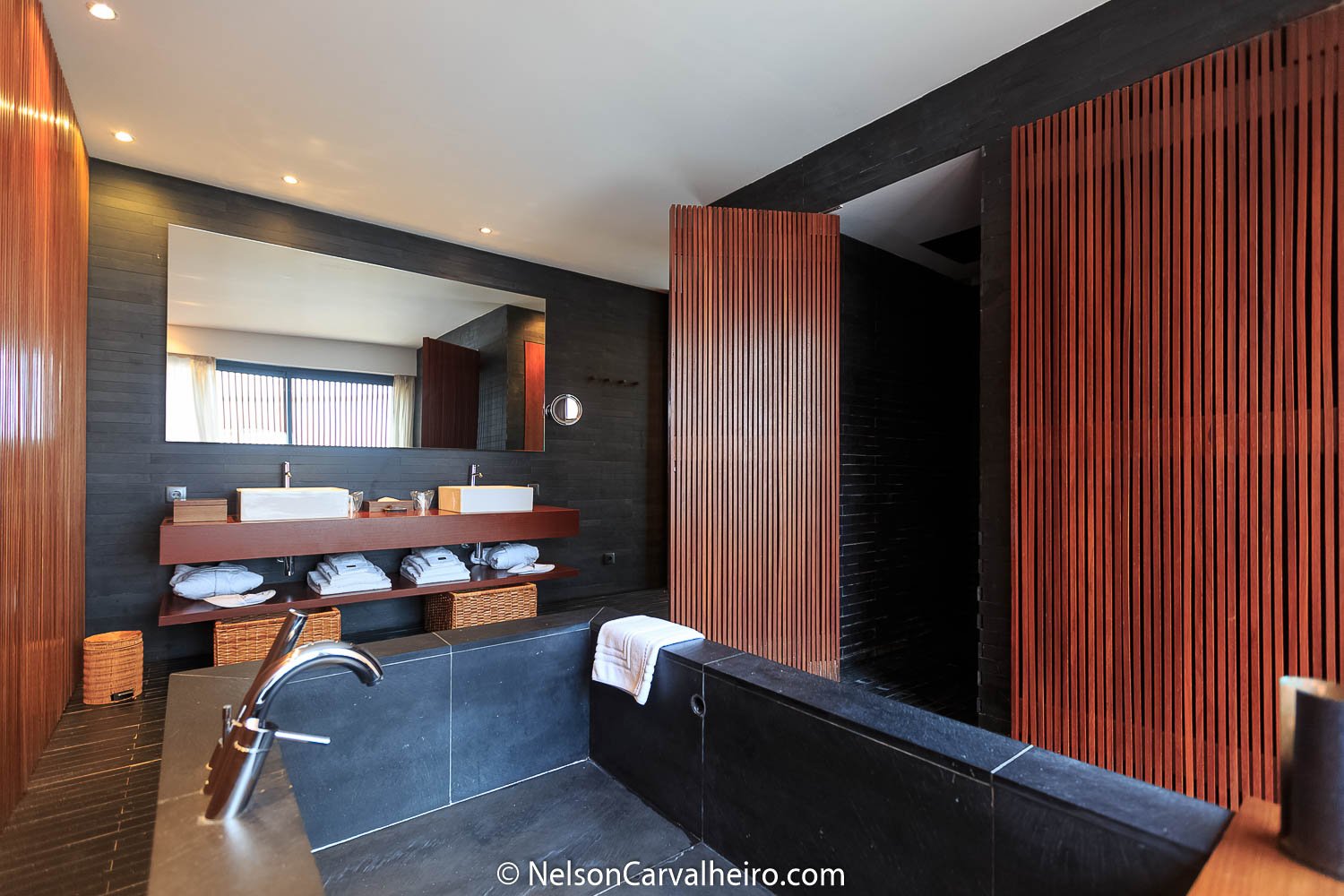
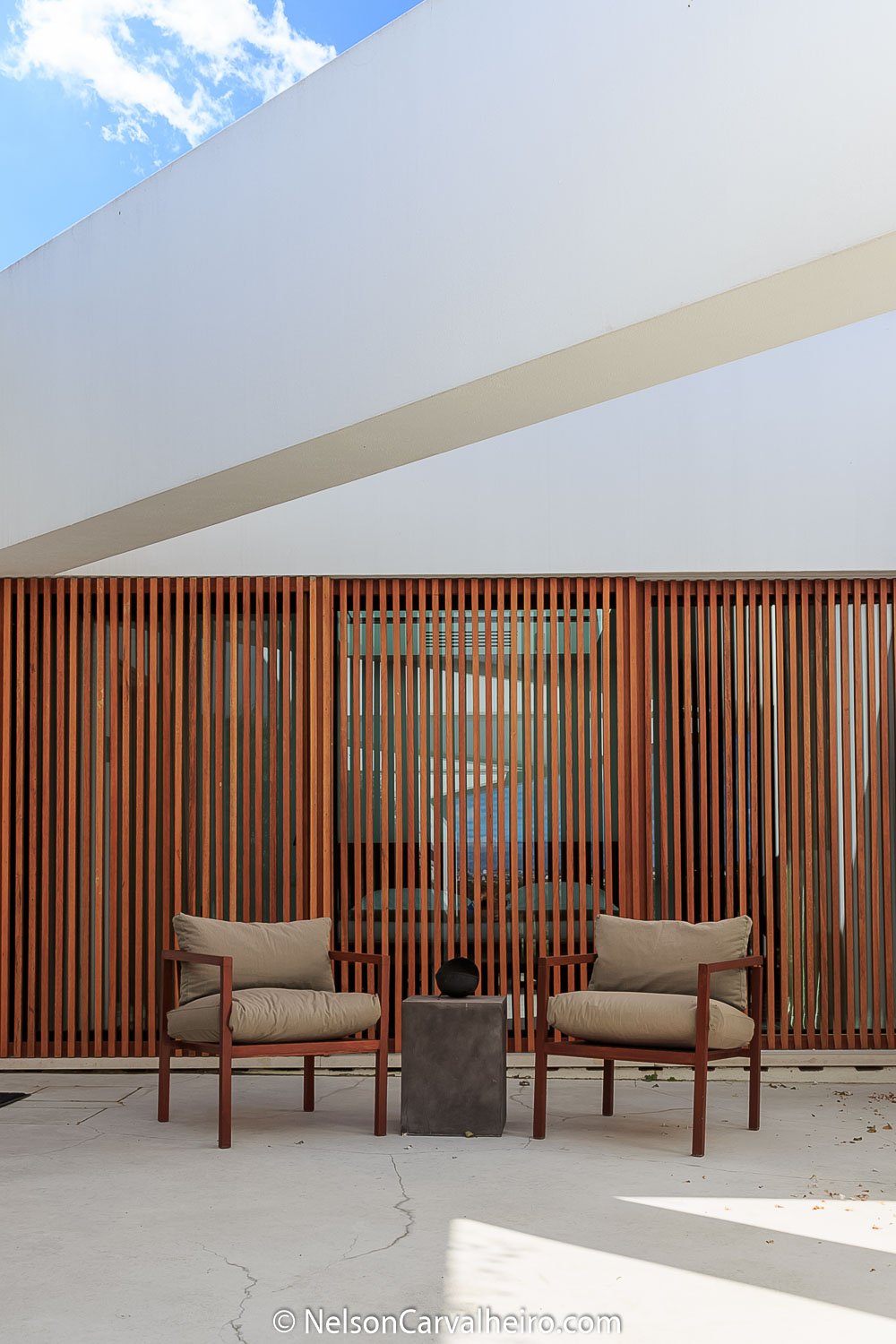 Wine Tasting with L’AND Sommelier (Gonçalo Mendes)
Wine Tasting with L’AND Sommelier (Gonçalo Mendes)
L’AND only produces a very small amount of wine. It is just for their clients and for the consumption of the L’AND restaurant. This is evident when one looks at their total vineyard area – just 6 hectares. For the last 5/6 years, they have averaged about 9000 bottles of production per year. Still, in this micro vineyard, they planted 4 varieties of white grapes: Antão Vaz, Arinto, Roupeiro and Verdelho and 5 varieties of red grapes: Touriga Nacional, Touriga Franca, Alicante Bouschet, Sirah, and Cabernet Sauvignon. Gonçalo explains how the Verdelho grape is Portugal’s go to variety when it comes to producing white wines, and how the Arinto variety takes it fullest form in the Alentejo terroir. Antão Vaz is an autochthonous grape from the Alentejo (from the Vidigueira area) and surely the one with most representation on the white wine market from this region.Rather than transcribing the technicalities of the wines, or what goes well with the selection of cheeses, salmon, jam and charcuterie from the region, I will tell you about the man. It most likely that you will meet him if you ever visit L’AND and I think it is important to know the man behind the choice of wines at your dinner.
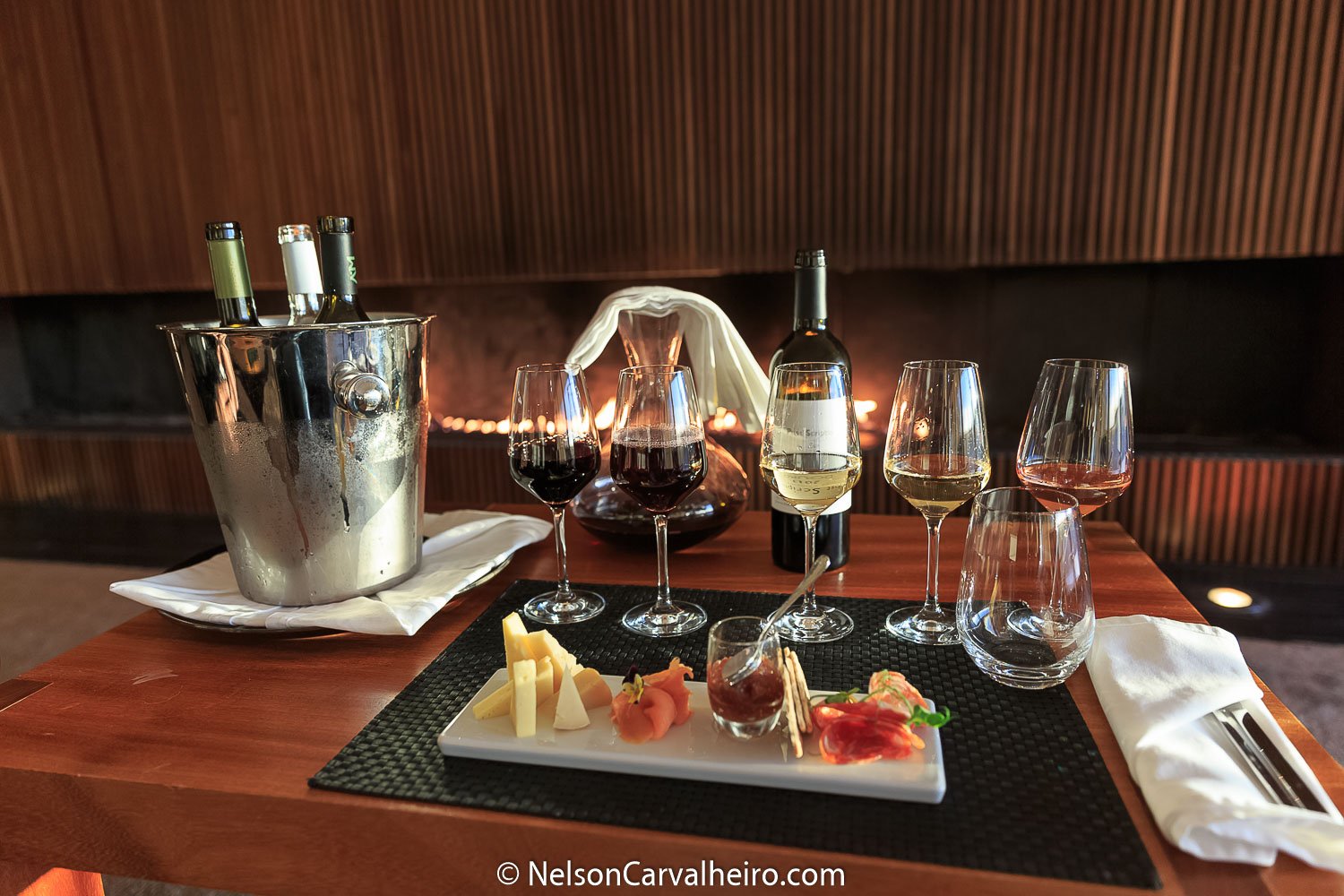 Clearly Gonçalo is a professional who loves is the job and since he is a local, he speaks very heartily about the wines from the land where he was born. “The Alentejo has so much raw potential, so much untapped resources to offer to its visitors, that I am afraid that the recent wine tourism spotlight that is being shined in this area, will eventually lead to mass tourism and spoil the one-to-one, quiet and long lasting experiences one has with the territory” says Gonçalo. He goes on to explain that guests who come to the L’AND are very knowledgeable about wine and very specific with what they are looking for. These are clients who are making their 5th, 7th of the even 10th wine tour, so they are mostly interested in three things: what is local, what is genuine and something new that they never tasted before. This is the approach, Gonçalo takes in choosing the wine that makes up the list at the L’AND Restaurant. He tells me that he also travels a lot within Portugal to taste wines and to meet the producers, so don’t try to outsmart him on Portuguese wines. Now he just needs to gain some international experience and he will be someone to look out for in the future. Good Luck Gonçalo.
Clearly Gonçalo is a professional who loves is the job and since he is a local, he speaks very heartily about the wines from the land where he was born. “The Alentejo has so much raw potential, so much untapped resources to offer to its visitors, that I am afraid that the recent wine tourism spotlight that is being shined in this area, will eventually lead to mass tourism and spoil the one-to-one, quiet and long lasting experiences one has with the territory” says Gonçalo. He goes on to explain that guests who come to the L’AND are very knowledgeable about wine and very specific with what they are looking for. These are clients who are making their 5th, 7th of the even 10th wine tour, so they are mostly interested in three things: what is local, what is genuine and something new that they never tasted before. This is the approach, Gonçalo takes in choosing the wine that makes up the list at the L’AND Restaurant. He tells me that he also travels a lot within Portugal to taste wines and to meet the producers, so don’t try to outsmart him on Portuguese wines. Now he just needs to gain some international experience and he will be someone to look out for in the future. Good Luck Gonçalo.
Breakfast at L’AND
Like Mario Morais (General Manager of L’AND) mentioned in our dinner the night before, if you want to get a Michelin Star in a Hotel restaurant, you have to start with breakfast. I absolutely loved this quote, and it will be one that wish to refer to every time I visit an aspiring property. For those who think that coming to the L’AND for breakfast means that they will get a mile-long buffet, they best head back to Lisbon. The items on display are fairly reduced because the majority of the food is cooked to order: just for you. I can’t begin to tell you how much I love this, and how much this plays to my personal wishes for what a proper luxury breakfast should be all about. The organic detox juices are another good example: the green one is made from spinach, cucumber, ginger, granny smith apple, and lemon. The red one is beetroot, orange, carrot, celery and red apple. These come in very handy first thing in the morning to cleanse your tongue and your thirst from all the wine drinking of the night before. Another great example is their Granola, which Miguel Laffan boasts about, as he makes it himself. The pancakes come with local cottage cheese (requeijão) and honey from a honeycomb from a local organic producer which is on display in the breakfast room. Even my poached egg came in a warm cast iron pan. Precious…Also to be noted, this was the only place in my whole journey where I was served a proper latte macchiato for breakfast.
Convento do Espinheiro
Built in the XV century, Convento do Espinheiro was been one of my favorites Heritage to Hotel Conversions in Portugal. As you will see further ahead, I have dined and slept here in the past. Quite a few times I might add. I always loved to stay here, as it is almost like you are living the life of the Portuguese Royal Family when they used this convent as their home every time they were in Evora. Plus, it is a living museum, with sacred art portraits and statues. The convent even has its own church, with walls lined with Portuguese azulejos and ceiling frescoes. Luxuriously redecorated, the Convento do Espinheiro is today considered a national monument, that works with renown brand Luxury Collection of company Starwood Hotels & Resorts. This ensures quality and consistency of service delivered by the team lead by Maria Carapinha, the Hotel’s General Manager. This Hotel is also inserted in a sumptuous garden of 8 hectares, where guests can wander in privacy and take the most of the soft Alentejo Landscape.


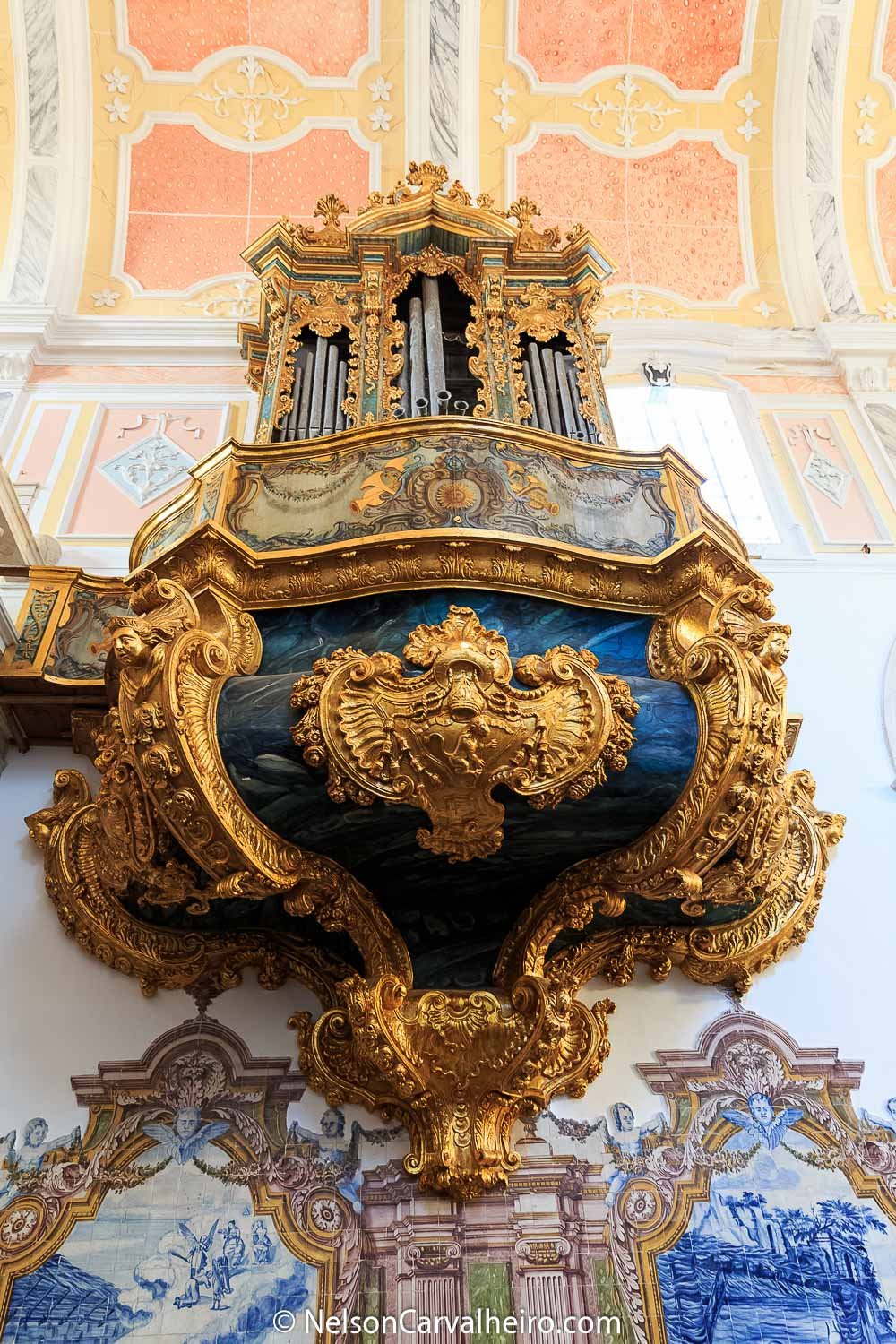 Brilliantly fitting the old and the new, Convento do Espinheiro has added a new “design Section”, with the addition of 36 contemporary rooms with views to the pool and the interior garden. This was where I stayed. Inspired by the 1950’s, the Design guest rooms welcome guests with a balanced combination of modern decor and 15th-century heritage in a spacious living area. Design guest rooms are all located in the new wing of the hotel; with a modern design to reflect the glamor and luxury of the 1950’s and showcase stunning views of the resort’s vast landscape.On top of all of this and what I love more about this hotel is the Divinus Restaurant and the creations of Chef Bouazza Bouhlani. Converted from the convent’s ancient wine cellar, Chef Bouazza presents the Guests of Convento do Espinheiro genuine flavors of the Alentejo region’s gastronomy, with a touch of sophistication and refinement.
Brilliantly fitting the old and the new, Convento do Espinheiro has added a new “design Section”, with the addition of 36 contemporary rooms with views to the pool and the interior garden. This was where I stayed. Inspired by the 1950’s, the Design guest rooms welcome guests with a balanced combination of modern decor and 15th-century heritage in a spacious living area. Design guest rooms are all located in the new wing of the hotel; with a modern design to reflect the glamor and luxury of the 1950’s and showcase stunning views of the resort’s vast landscape.On top of all of this and what I love more about this hotel is the Divinus Restaurant and the creations of Chef Bouazza Bouhlani. Converted from the convent’s ancient wine cellar, Chef Bouazza presents the Guests of Convento do Espinheiro genuine flavors of the Alentejo region’s gastronomy, with a touch of sophistication and refinement.

 There is a new cuisine attraction at Convento do Espinheiro called Tasca do Chef. An old garden hut, which was transformed into a traditional Portuguese eatery serving Traditional cuisine typical from the Alentejo. It is located next to the convent’s garden, where chef Bouazza produces no fuss heartwarming dishes like cold gazpacho soup, fried black pork cubes, and homemade sericiaia. Also, don’t for the pool at sundown, especially in hot summer days.
There is a new cuisine attraction at Convento do Espinheiro called Tasca do Chef. An old garden hut, which was transformed into a traditional Portuguese eatery serving Traditional cuisine typical from the Alentejo. It is located next to the convent’s garden, where chef Bouazza produces no fuss heartwarming dishes like cold gazpacho soup, fried black pork cubes, and homemade sericiaia. Also, don’t for the pool at sundown, especially in hot summer days.
Herdade da Malhadinha Nova
Herdade da Malhadinha Nova is located in Albernoa, in the heart of Baixo Alentejo and offers comfort and design in a relaxed harmony with its surrounding Landscape. Even though it is the furthest of the Wine Tourism businesses when you depart from Lisbon, owner Rita Soares has set up her business in a way that her guests feel that the long journey was totally worth it. First, she enforces a two-night minimum for all guests that stay with her. I was the obvious exception, as because of my tight schedule. I could only afford to stay one night. This was duly noted in the first line of conversation when she drops the hint that even the world’s most influential wine Guru Robert Parker, stayed for 3 nights.Rita’s idea was to create a sort of retreat, where its guests did not need to leave the property for the two nights they are her guests. Beyond the 600 hectares that the estate occupies, the vineyards and the olive fields where guests can walk and have picnics. Herdade da Malhadinha produces its own olive oil, its own beef, and black pork, it has a respectable restaurant, a Lusitano horse stable for those who wish to ride, a spa and plenty of bird watching lookouts. One can say that it is like a condensed Alentejo Theme Park.

 More so, its concept is based on offering experiences wrapped in the theme of wine, as well as Wine Tourism, Hotel, and Restaurant. Wines are the Herdade da Malhadinha Nova ex-libris and reflect a huge respect for Nature and for all the passion and dedication taken for their creation. The vines were planted in 2000 taking now the total area of 33 ha. (81 ac.) – 27 ha. (66 ac.) on production and 6 ha. (15 ac.) of new vine. The ecotourism experiences and the modern Cellar, combining traditional winemaking methods with technology, are one of the best reasons to visit the Herdade. On top of everything they produce Monte da Peceguinha, my absolute favorite all time white wine of the Alentejo.
More so, its concept is based on offering experiences wrapped in the theme of wine, as well as Wine Tourism, Hotel, and Restaurant. Wines are the Herdade da Malhadinha Nova ex-libris and reflect a huge respect for Nature and for all the passion and dedication taken for their creation. The vines were planted in 2000 taking now the total area of 33 ha. (81 ac.) – 27 ha. (66 ac.) on production and 6 ha. (15 ac.) of new vine. The ecotourism experiences and the modern Cellar, combining traditional winemaking methods with technology, are one of the best reasons to visit the Herdade. On top of everything they produce Monte da Peceguinha, my absolute favorite all time white wine of the Alentejo.
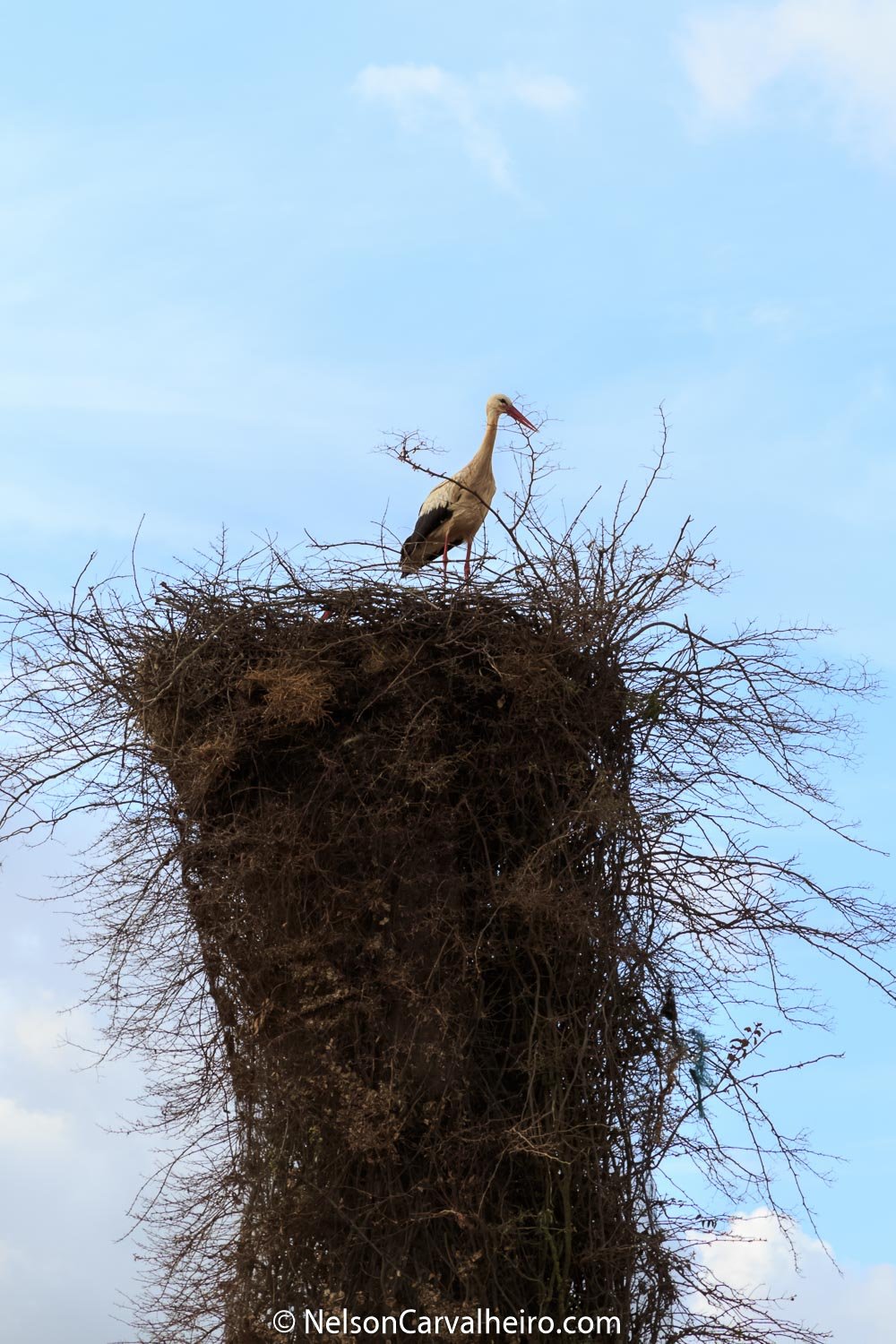
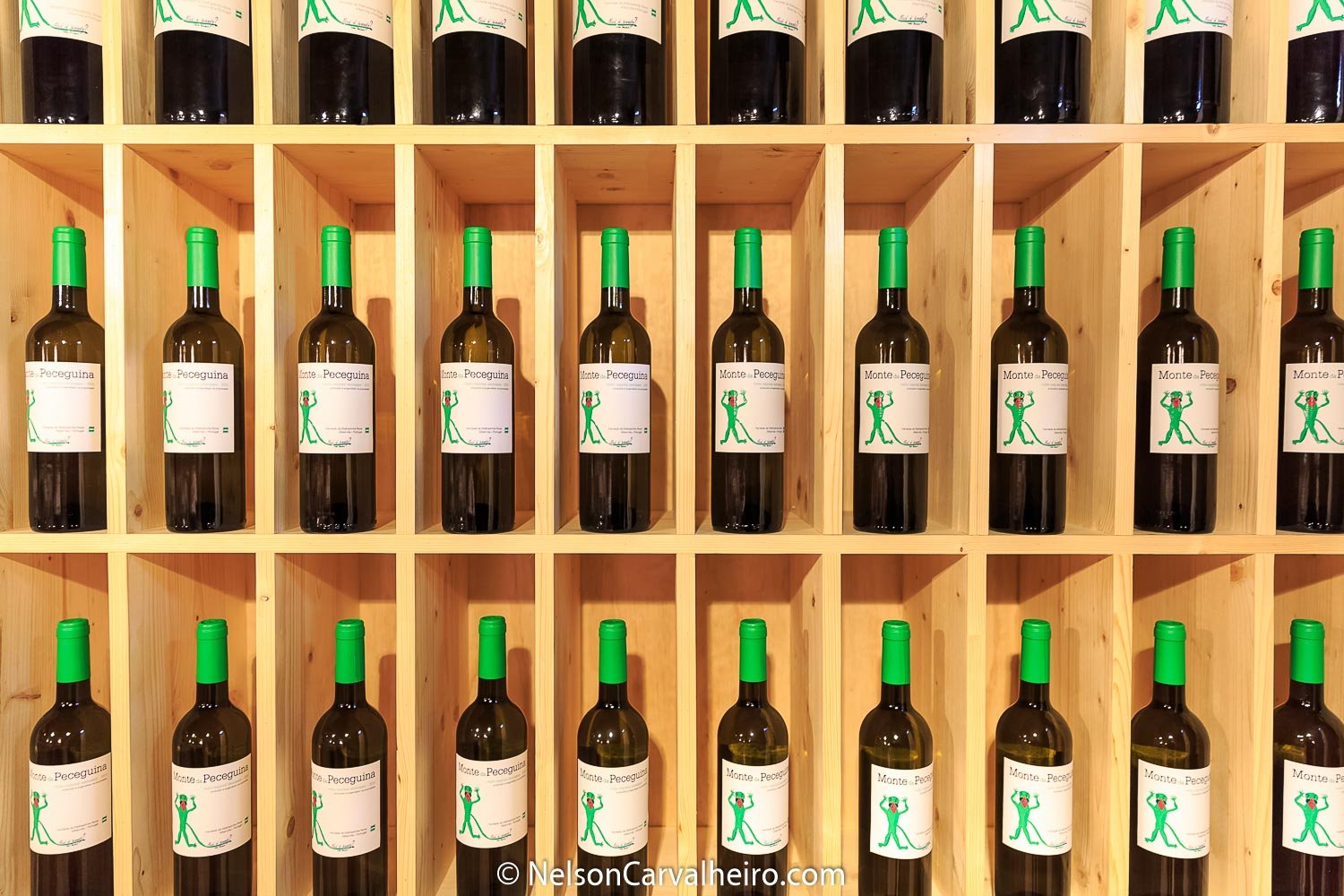
Torre de Palma
In the heart of the Alto Alentejo, lost in time near the village of Vaiamonte, you will find this real treasure. Inspired by the lifestyle of the distinguished Basilii family – the ancient inhabitants of the nearby Roman ruins of Torre de Palma – and by the Alentejo traditions, the Torre de Palma Wine Hotel is more than just a hotel, it was born to be a home in the Alentejo. Owner Ana Isabel Rebelo reconverted this property in a way that merges tradition with the audacity of modernity. For this, she employed designer Rosarinho Gabriel, who became famous for her work at the Areias do Seixo Hotel. She added interior style and persona to this hotel, although sometimes, it can feel that it is too much designed and less practical. Nevertheless, this is what makes it special and I have to congratulate them both for wanting to make such a distinct and self-conscious project in this remote region.

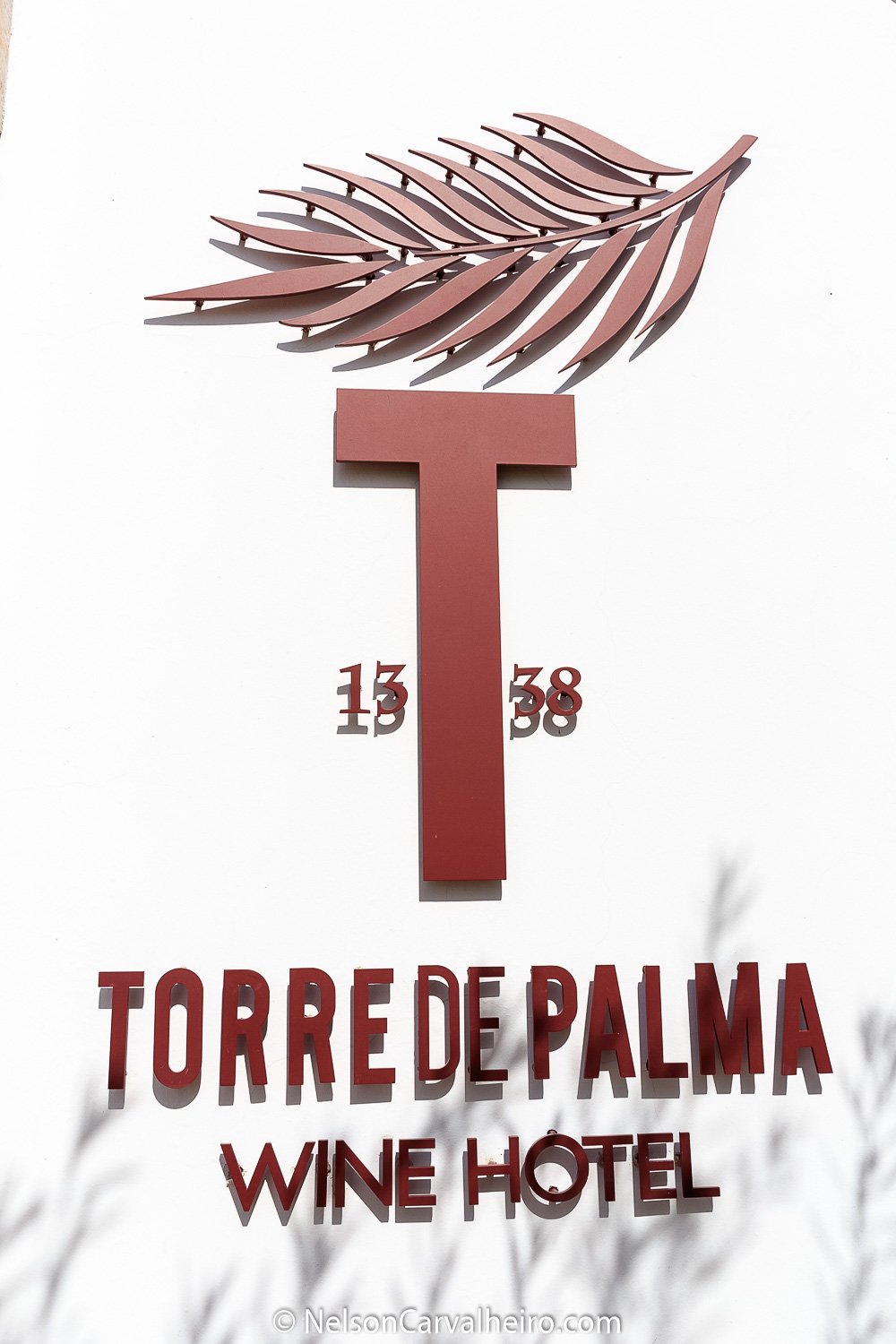 There once was a tower here that reached up to the sky and gave this place its name. The views from its ramparts could not be more idyllic. At dusk, the sun slowly sets and lights up the sky, painting it pink and orange, leaving us with the peace that is typical of the Alentejo landscape. A few minutes later the inevitable happens, and we fall in love with Torre de Palma. In a renovated manor house of the 14th century, the Torre de Palma Wine Hotel has been luxuriously restored and features simple and sophisticated lines. Dating from 1338, the views offered from this manor house made us dream and wish to make this a place you can enjoy. The Palm Tower Wine Hotel has19 thematic rooms in different Alentejo houses as well as a rural loft, an old barn and the manor house with the master suite. The hotel offers indoor and outdoor swimming pools, a spa and a wellness center, a library, and the Basili Restaurant. After a lot of hard work, this year the dream has become the reality with the birth of the Torre de Palma, Wine Hotel. All the places and corners of Torre de Palma, indoor or outdoor care. Is a place full of history and charisma, where we can find more than a relaxing and delightful hotel to be in.
There once was a tower here that reached up to the sky and gave this place its name. The views from its ramparts could not be more idyllic. At dusk, the sun slowly sets and lights up the sky, painting it pink and orange, leaving us with the peace that is typical of the Alentejo landscape. A few minutes later the inevitable happens, and we fall in love with Torre de Palma. In a renovated manor house of the 14th century, the Torre de Palma Wine Hotel has been luxuriously restored and features simple and sophisticated lines. Dating from 1338, the views offered from this manor house made us dream and wish to make this a place you can enjoy. The Palm Tower Wine Hotel has19 thematic rooms in different Alentejo houses as well as a rural loft, an old barn and the manor house with the master suite. The hotel offers indoor and outdoor swimming pools, a spa and a wellness center, a library, and the Basili Restaurant. After a lot of hard work, this year the dream has become the reality with the birth of the Torre de Palma, Wine Hotel. All the places and corners of Torre de Palma, indoor or outdoor care. Is a place full of history and charisma, where we can find more than a relaxing and delightful hotel to be in.
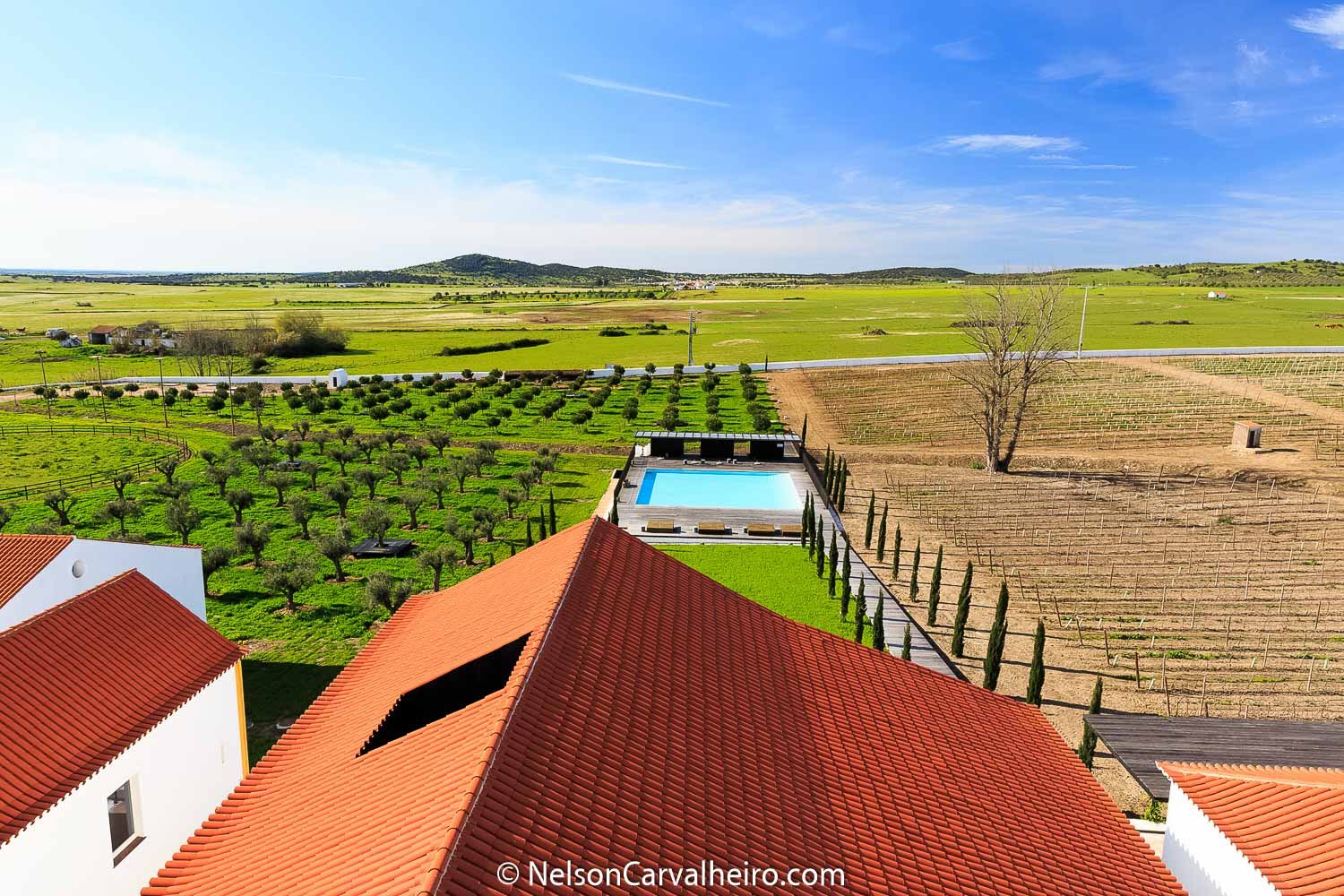
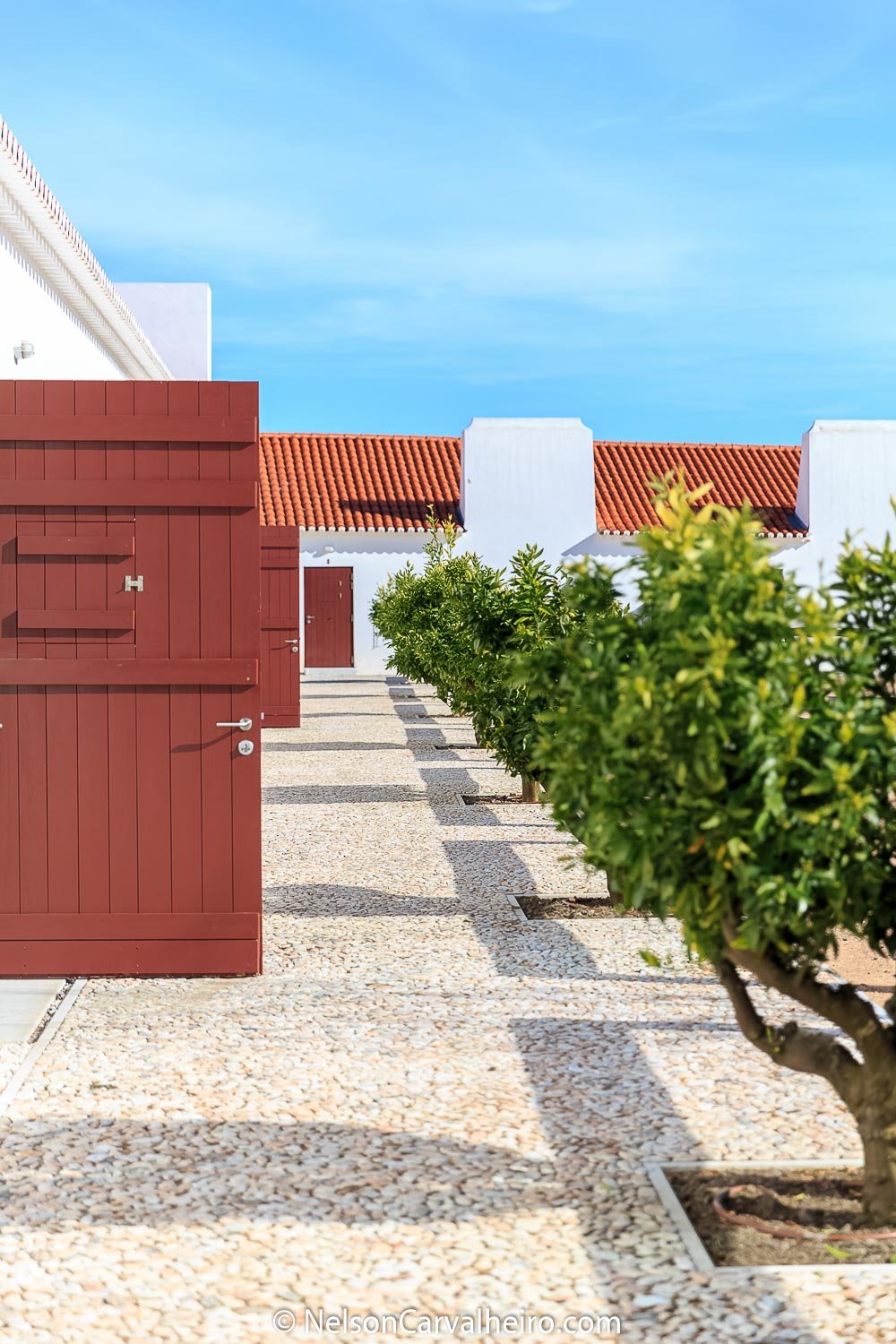
 In the same aggregated manner of Herdade da Malhadinha Nova, Torre de Palma is a “destination” in itself. Because of their remote locations, they understood the need to add several layer to their product. In the case of Torre de Palma, they take form in the walks around the estate, farming, horse riding, Star Gazing, bird watching, spa treatments and Alentejo cuisine workshops. Although my visit at Torre de Palma was short lived I got to ride a Lusitano mare named Azeitona (more details bellow) and have a traditional Alentejo cuisine workshop with Chef Filipe Ramalho. We made Açorda Alentejana , where the garlic, red pepper, and pennyroyal infusion was made in a vacuum pot. A novelty, I admit, but clearly aimed at impressing the foreigners. Even more, when he caramelizes the sardine loins with a blow torch in front of you. He also made me a reinvention of Sericaia with lemon sorbet, which was good, but made the mistake of filling the cocktail glass with Chantilly. Chef Filipe is very young, he is only 26 years old, and a talent to look out for in the future. I just wish his he tones down his kitchen “mavericksness” a bit.
In the same aggregated manner of Herdade da Malhadinha Nova, Torre de Palma is a “destination” in itself. Because of their remote locations, they understood the need to add several layer to their product. In the case of Torre de Palma, they take form in the walks around the estate, farming, horse riding, Star Gazing, bird watching, spa treatments and Alentejo cuisine workshops. Although my visit at Torre de Palma was short lived I got to ride a Lusitano mare named Azeitona (more details bellow) and have a traditional Alentejo cuisine workshop with Chef Filipe Ramalho. We made Açorda Alentejana , where the garlic, red pepper, and pennyroyal infusion was made in a vacuum pot. A novelty, I admit, but clearly aimed at impressing the foreigners. Even more, when he caramelizes the sardine loins with a blow torch in front of you. He also made me a reinvention of Sericaia with lemon sorbet, which was good, but made the mistake of filling the cocktail glass with Chantilly. Chef Filipe is very young, he is only 26 years old, and a talent to look out for in the future. I just wish his he tones down his kitchen “mavericksness” a bit.
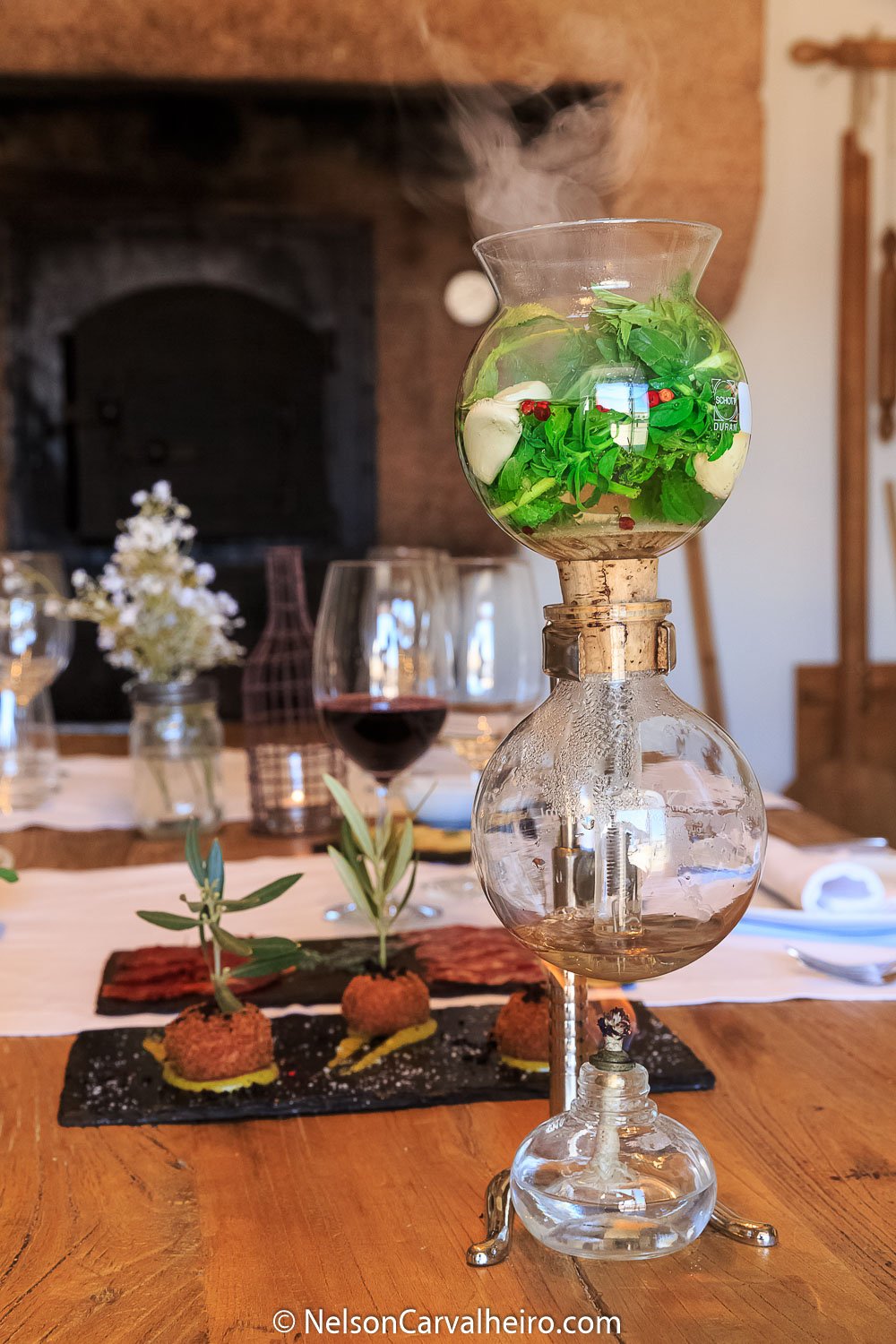
Alentejo Best Restaurants
Evora has become the gastronomic heartland of the Alentejo and has identified itself as the ambassador for the cuisine from all the Alentejo, especially to visitors who come for just a few days while visiting Portugal. As with any nation that prides itself on its heritage food, it always pairs it with Alentejo wine. No other possibility exists. Before tourists came just to spend the day, now they come and stay for three or four. It is no longer visited only the city of Évora, were discovered the charms of Vila Viçosa, Borba, Monsaraz, not to mention the Alqueva or the Alentejo coast.
This high demand allowed that the regional gastronomy differentiates itself and has entered in the most elaborate kitchens, something that is possible due to the wealth of pre-existing dishes. The challenge in turning “poor food” in something with the worldwide recognition of “haute cuisine” was finally achieved.
L’AND Restaurant
In order to dissipate all doubts, L’AND is by far the best restaurant in Alentejo. I know that I am going to be crucified for this remark, especially when there are so many places which I have yet to visit (like Mercearia Gadanha), however, this saying comes, not just from my personal experience, but from conversations I have had with fellow colleagues over the last year. Before I further explain the previous statement, I would like to add another premise, as it is necessary to make my point. The second bold statement that I would like to make is that the L’AND Restaurant and Chef Miguel Laffan are one single entity. There is no L’AND without Miguel and Miguel cannot live without L’AND. The deterrent evidence of this theory is L’AND’s Michelin Star achievement in 2014 and its subsequence lost in 2016. It was Miguel who gave the Alentejo a Michelin Star and it was his absence from L’AND that ultimately lost it.
 I didn’t know Miguel before our dinner, neither I had ever tasted any of his work, but somehow I always sympathized with him. Pretty much the same feeling like I had with Ricardo Costa, from The Gastronomic Restaurant at the Yeatman or the feeling I have for Chef Cordeiro (whom I have yet to meet). Miguel’s greatest achievement, and what the critics didn’t understand when they kept hammering him with the “why did you lose the star” question is that this guy managed to put Alentejo Food on the map. His cuisine is almost 100% based on Alentejo and Portuguese produce, techniques, flavors and most of all Miguel’s genius.
I didn’t know Miguel before our dinner, neither I had ever tasted any of his work, but somehow I always sympathized with him. Pretty much the same feeling like I had with Ricardo Costa, from The Gastronomic Restaurant at the Yeatman or the feeling I have for Chef Cordeiro (whom I have yet to meet). Miguel’s greatest achievement, and what the critics didn’t understand when they kept hammering him with the “why did you lose the star” question is that this guy managed to put Alentejo Food on the map. His cuisine is almost 100% based on Alentejo and Portuguese produce, techniques, flavors and most of all Miguel’s genius.
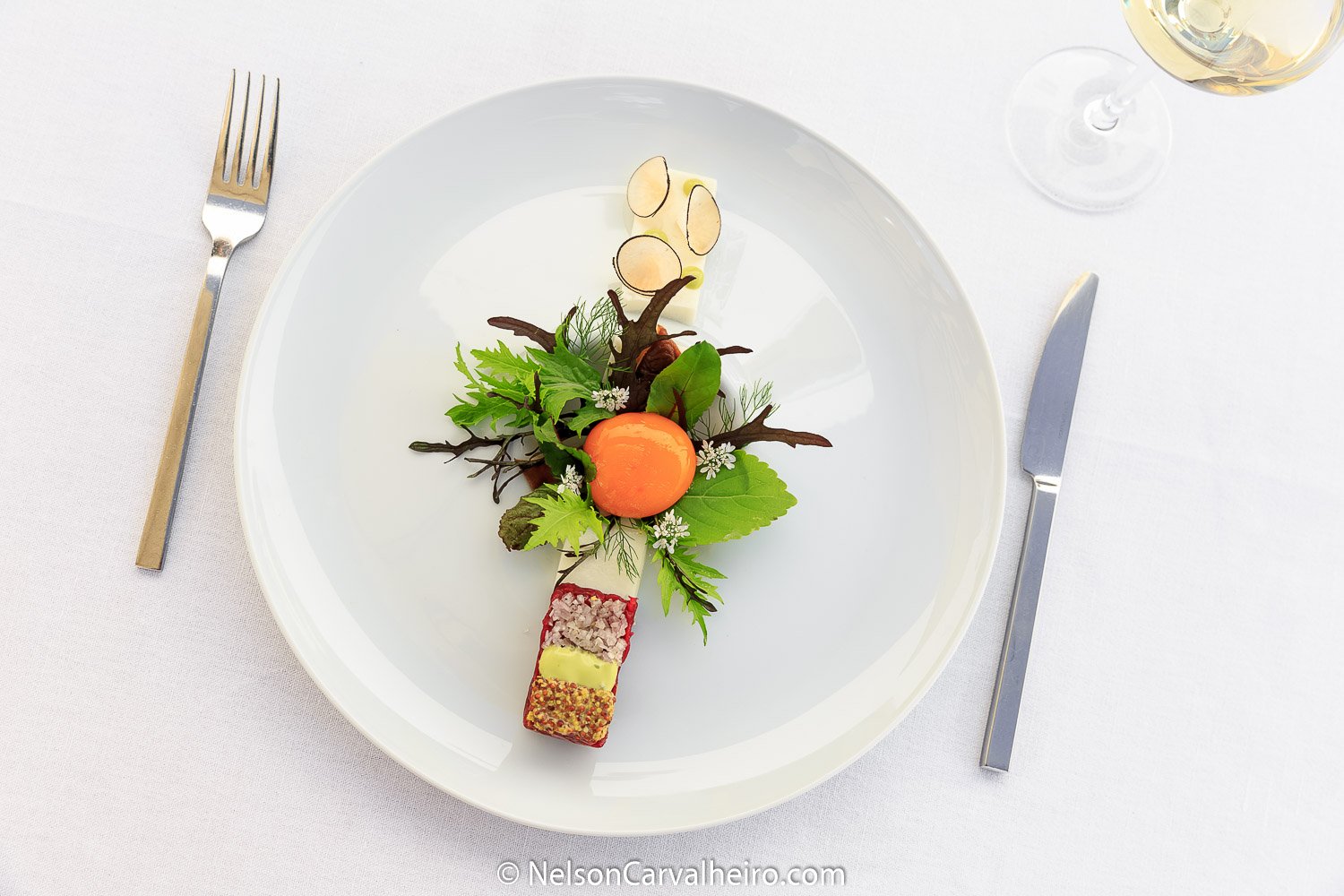
What he did, was take this rough, peasant feeding cuisine and bring it to its fullest splendor. Gaining Michelin Star with resource to French and Italian inspiration is easy, but to take a regional Alentejo product like Cabeça de Xara – a pâté made from the soft pieces (not the brain) of a pig’s head, which he makes himself in the restaurant, and turn it into a fine dining is somewhat of an achievement. Especially when you top it with langoustine tartar and serve it with fennel pure, and bergamot. This is a prime example of the creativeness that Miguel has brought to the Alentejo and what ultimately won it the Michelin Star. Also, this Michelin star helped in this international projection of the Alentejo as a wine and gastronomy region of global interest.
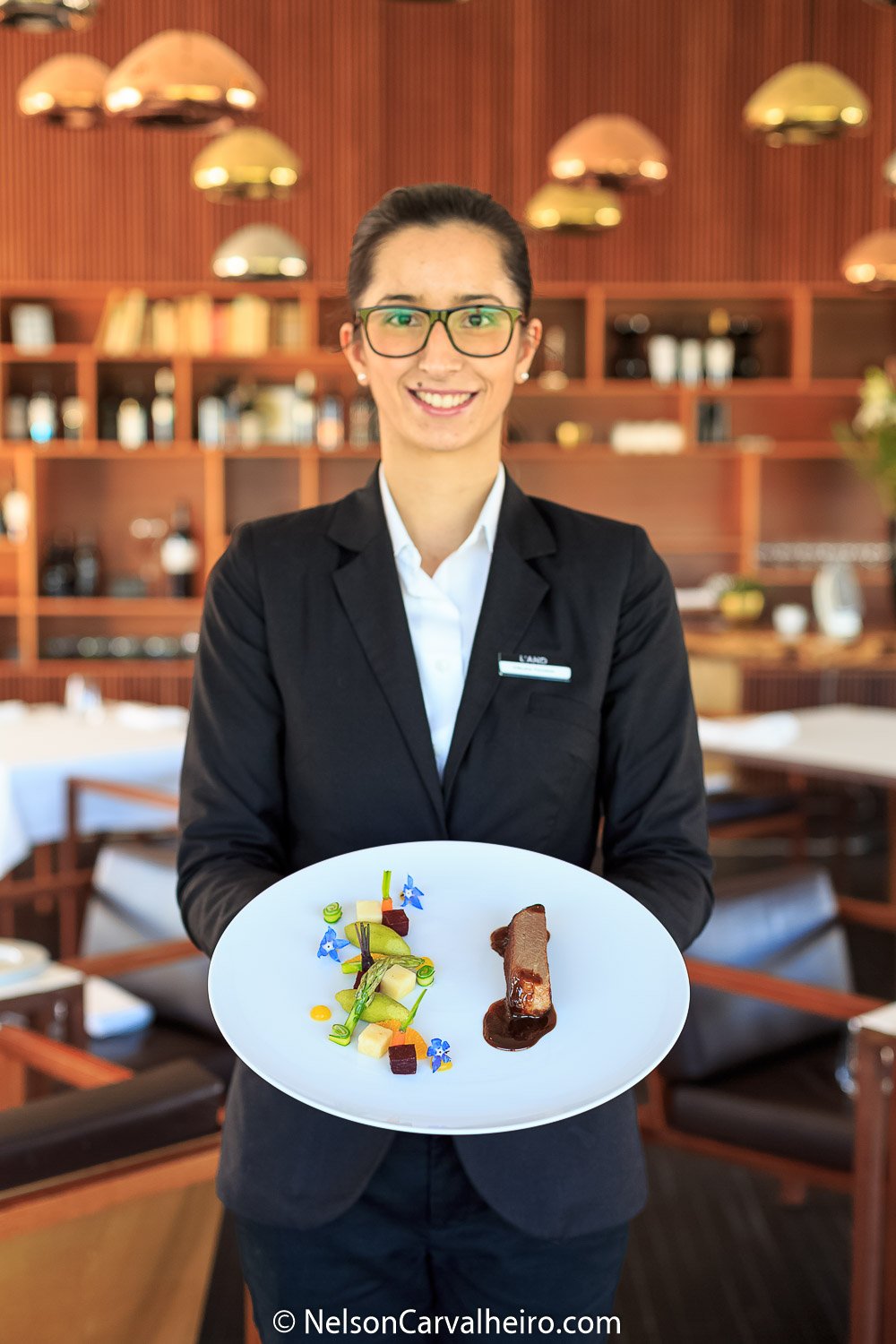 And this is exactly what Chef Miguel Laffan does best, to be disruptive, yet conscious, to challenge the status quo, while respecting the culinary heritage, to make you play catch up with the multiple layers of flavors which his dishes keep delivering in your palate. The same thing for the Alentejo steak tartar pictured bellow, which is served with fresh mustard seeds, a Parmigiano-Reggiano fondant and slow cooked egg yolk. Even something so simple as a Pork neck is plated with miso and paprika, green asparagus and citrus fruit.
And this is exactly what Chef Miguel Laffan does best, to be disruptive, yet conscious, to challenge the status quo, while respecting the culinary heritage, to make you play catch up with the multiple layers of flavors which his dishes keep delivering in your palate. The same thing for the Alentejo steak tartar pictured bellow, which is served with fresh mustard seeds, a Parmigiano-Reggiano fondant and slow cooked egg yolk. Even something so simple as a Pork neck is plated with miso and paprika, green asparagus and citrus fruit.
 Miguel defines L’AND as “…an affirmation of the new Portuguese gastronomic culture. One that not only reflects our history and our culture but also integrating the experiences and ingredients resulting from discoveries in the Far East. I wish to transport my patrons on a culinary journey, a journey inspired by the natural environment surrounding the L’AND Vineyards. My dishes are influenced by the Alentejo cuisine with a contemporary interpretation.”
Miguel defines L’AND as “…an affirmation of the new Portuguese gastronomic culture. One that not only reflects our history and our culture but also integrating the experiences and ingredients resulting from discoveries in the Far East. I wish to transport my patrons on a culinary journey, a journey inspired by the natural environment surrounding the L’AND Vineyards. My dishes are influenced by the Alentejo cuisine with a contemporary interpretation.”
 Our dinner lasted for over 3 hours, and we were joined halfway by Mario, the L’ANDs GM. Rather than taking photos of the dishes and notes about what I was eating and drinking, I listened to Miguel. I did no judge him, evaluated him or asked him any silly questions, or even interrupted our moments together to post something on Instagram, I just sat there and observed. I observed the man who is not a natural from the Alentejo but loves this land like if he had been born here (which is the case of Mario). A Chef which is humble enough to ask if he could address me in the first person 5 minutes after we sat together. A fellow food lover who rather than shoving his pride down my throat enjoyed the food and wines we were served as if he was me, the first timer at his restaurant. And finally, the three of us enjoyed a sumptuous time together, talking about everything in life, calling mutual friends (this means you Jorge) and just being three Portuguese men at the table.
Our dinner lasted for over 3 hours, and we were joined halfway by Mario, the L’ANDs GM. Rather than taking photos of the dishes and notes about what I was eating and drinking, I listened to Miguel. I did no judge him, evaluated him or asked him any silly questions, or even interrupted our moments together to post something on Instagram, I just sat there and observed. I observed the man who is not a natural from the Alentejo but loves this land like if he had been born here (which is the case of Mario). A Chef which is humble enough to ask if he could address me in the first person 5 minutes after we sat together. A fellow food lover who rather than shoving his pride down my throat enjoyed the food and wines we were served as if he was me, the first timer at his restaurant. And finally, the three of us enjoyed a sumptuous time together, talking about everything in life, calling mutual friends (this means you Jorge) and just being three Portuguese men at the table.
 The fact of the matter is that now Miguel is back to L’AND and an almost certainty that the award will be back on the table in 2017.
The fact of the matter is that now Miguel is back to L’AND and an almost certainty that the award will be back on the table in 2017.
Divinus Restaurant
Inside this 15th century monument, the Divinus Restaurant is located in the old cellar of the convent, where the symbiosis between history, authenticity and gastronomy is perfect. Chef Bouazza interprets the Alentejo cuisine with great passion, taking it as his starting point of the original recipes of this gastronomy and treating each delicacy as unique. On the other hand, he challenges the imagination and creates his fusion dishes inspired by the Alentejo. The Divinus’ menu is divided into traditional and author cuisine; the choice is not easy as you can choose soups and stews, “migas” and “migalhas” (crumbs) or opt for the traditional snacks, but privileging every moment the use of certificated and indigenous products. Combined with an excellent service, sympathy and a wine list with huge references at a national level, the Divinus Restaurant is indeed a divine experience
 I have known Chef Bouazza Bouhlani for some time now. Even though I only meet in Person when we showed up to shoot some dishes for my Portuguese Travel CookBook in 2014, I had dined at Divinus on two occasions before. 2012 and 2013. There was always something special about the food I tasted here, and it was not only because the restaurant is inserted in the 15th century reconverted Convento do Espinheiro Hotel. The presentation has always outshined the pastel tones and silenced atmosphere the hotel. I mean, some of the arrangements I have eaten were beautiful masterpieces of art. This disruptive someone was Chef Bouazza, a Moroccan national, raised and educated in the culinary arts in Portugal.
I have known Chef Bouazza Bouhlani for some time now. Even though I only meet in Person when we showed up to shoot some dishes for my Portuguese Travel CookBook in 2014, I had dined at Divinus on two occasions before. 2012 and 2013. There was always something special about the food I tasted here, and it was not only because the restaurant is inserted in the 15th century reconverted Convento do Espinheiro Hotel. The presentation has always outshined the pastel tones and silenced atmosphere the hotel. I mean, some of the arrangements I have eaten were beautiful masterpieces of art. This disruptive someone was Chef Bouazza, a Moroccan national, raised and educated in the culinary arts in Portugal.
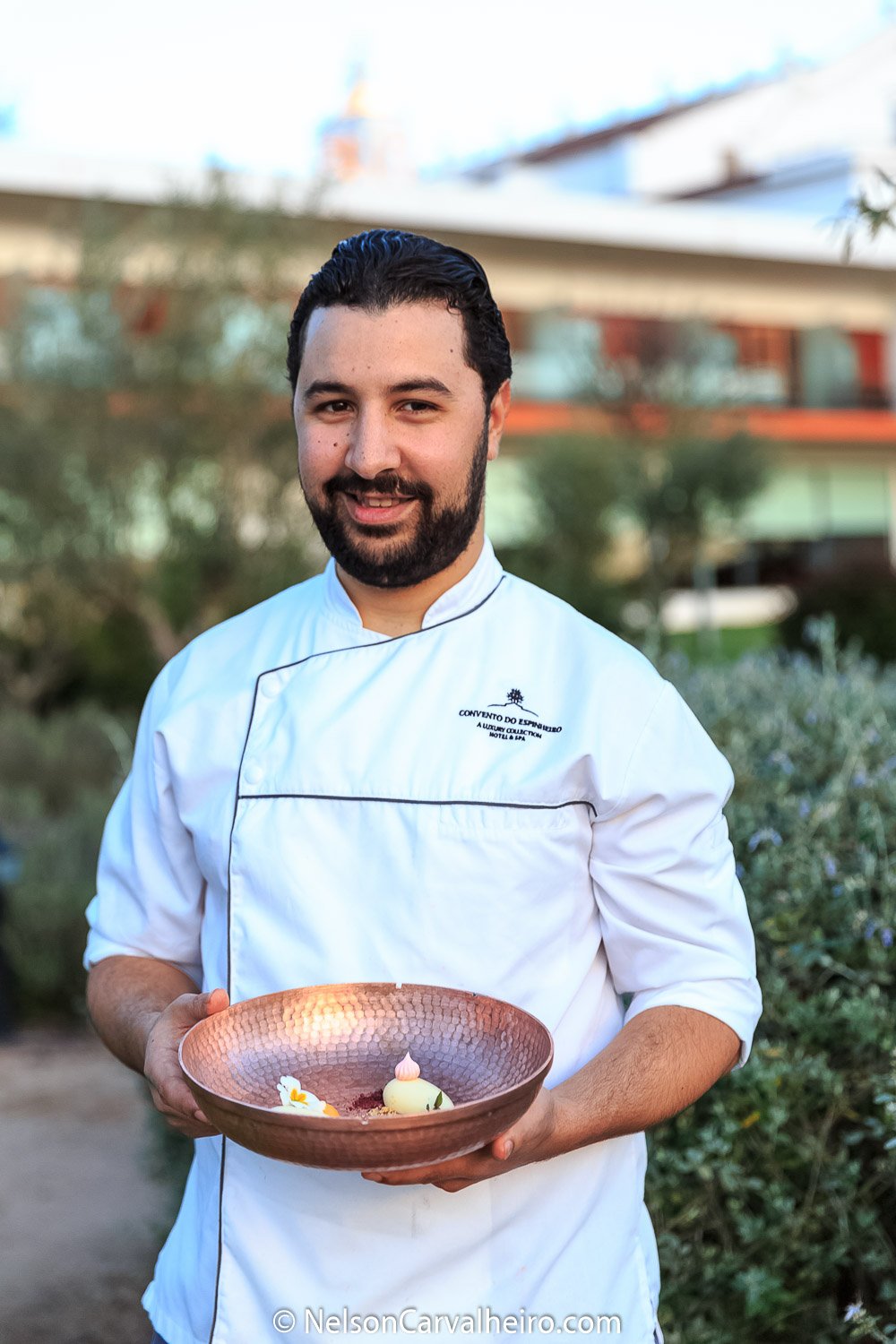 His design and forward vision into the dishes he presents to his patrons have always dazzled me. Sometimes, his work just seemed too good for this place. Too well “painted” and “sculpted”. It was almost as if they didn’t fit the location. My wonders on why Divinus never got a Michelin Star were explained by Chef Bouazza during our dinner together. “It is not for the lack of quality, presentation, or flavor I can assure you. It is a matter of situation. Divinus seats 80 persons, and when we have a full house, I must make sure they are all properly fed. Also, we cater a lot to functions and weddings, and this makes impossible to run a separate operation just for the restaurant. At the end of the day, Divinus is inserted in a 90 room boutique hotel, part of the Starwood brand. If we were a Relais and Châteaux, things would be different!”
His design and forward vision into the dishes he presents to his patrons have always dazzled me. Sometimes, his work just seemed too good for this place. Too well “painted” and “sculpted”. It was almost as if they didn’t fit the location. My wonders on why Divinus never got a Michelin Star were explained by Chef Bouazza during our dinner together. “It is not for the lack of quality, presentation, or flavor I can assure you. It is a matter of situation. Divinus seats 80 persons, and when we have a full house, I must make sure they are all properly fed. Also, we cater a lot to functions and weddings, and this makes impossible to run a separate operation just for the restaurant. At the end of the day, Divinus is inserted in a 90 room boutique hotel, part of the Starwood brand. If we were a Relais and Châteaux, things would be different!”
 Before we sat down to enjoy his brand new Summer/Spring menu, I challenged him to photograph some of his new courses in the Gardens of Convento do Espinheiro, as I believe they would shine even more in the twilight of an end of the day in Alentejo. Also, I was tired of shooting food inside a restaurant, and from looking at the photos, I am happy I did so.
Before we sat down to enjoy his brand new Summer/Spring menu, I challenged him to photograph some of his new courses in the Gardens of Convento do Espinheiro, as I believe they would shine even more in the twilight of an end of the day in Alentejo. Also, I was tired of shooting food inside a restaurant, and from looking at the photos, I am happy I did so.

Maria Carapinha, the director of the Convento do Espinheiro tells us that “the magic of the Alentejo cuisine is to create, with simple and traditional products, dishes where the taste and the pleasure of eating be a cultural act. Since the olive oil and Galician Cordovil to the flesh of mounted, since the Guadalupe bread to the flavorings that grow spontaneously in the torrid Alentejo plains … Of olive oil and Galician Cordovil to the flesh of mounted, of Guadalupe bread to the flavorings that grow spontaneously in the torrid Alentejo plains … Chef Bouazza Bouhlani and his brigade make science. “Because this kitchen requires love, imagination, and art, it is with great pleasure and excitement that we have prepared this table so that with your friendships, affinities and sympathies you have a memorable meal”, assures Maria.
 Proof of this determination to a higher valence to this food from humble beginnings, Chef Bouazza Bouhlani prepares dishes such as Roast crayfish and tartar of same, beet salad ; Passion fruit pannacotta, caramel rock, passion fruit mousse
Proof of this determination to a higher valence to this food from humble beginnings, Chef Bouazza Bouhlani prepares dishes such as Roast crayfish and tartar of same, beet salad ; Passion fruit pannacotta, caramel rock, passion fruit mousse
Degust’Ar
Located on the ground floor of the Sepúlveda Palace building, the Degust’AR restaurant has the gastronomic signature of the Chef António Nobre. The menu has as its starting point in the Alentejo cuisine, and the Chef develops his creative inspiration by exploring the Mediterranean flavors. The atmosphere is refined, comfortable and intimate. The vaulted ceilings, the horseshoe arches and some frescos on the walls, give the restaurant a unique and special character. The restaurant has a reception area with a bar and a cellar where you can find the nearly 150 wines that make up a wine list where all regions of Portugal are represented. Sadly, Chef António Nobre was not there to welcome me as originally arranged, but his Sous Chef Tiago Moreno was kind to accommodate my appointment. It was a Sunday afternoon and I arrived early, so the place was naturally empty. In one of the corner sides rooms, next to the window so I could photograph better. First up was the amuse bouche, a braised head of mushroom with oregano and cheese served in a clay pot. It is meant to be eaten with the fingers, so don’t make a fool out of yourself like I did, by trying to eat with a knife and fork.
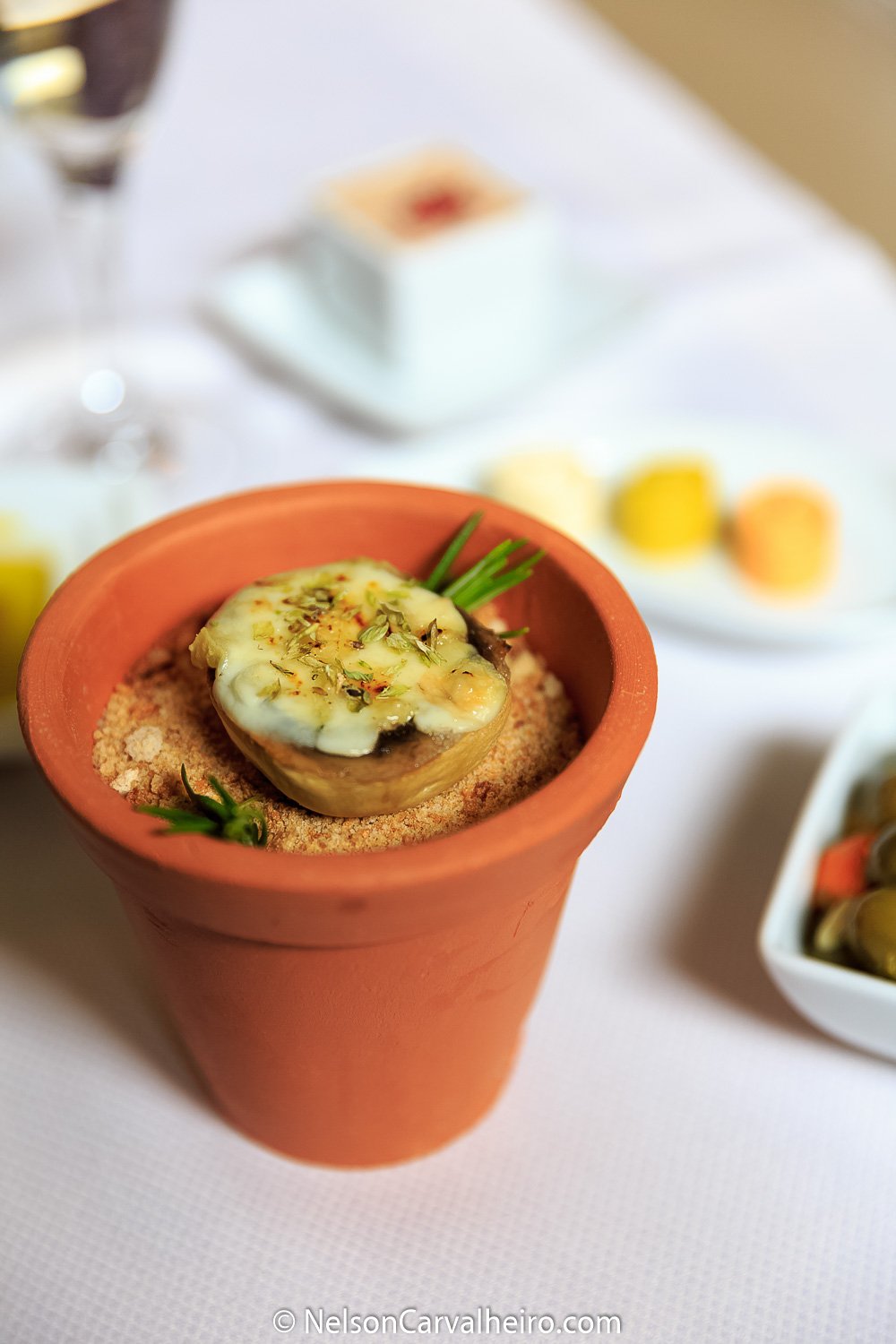
 The first starter and my preferred choice were a seared scallop atop a cauliflower purée and seafood foam. The black ink you see is dried ink from cuttlefish. Although this dish has very little to do with the Alentejo, I enjoyed it because it was fresh, simple and to the point. The second starter was filling with crab inside a puff pastry cake and Alentejo lettuce salad. The crab cake was good, and something I wish one could get on the go at a local snack bar with a cold beer. The fish course was a grilled loin of red snapper with orange supremes and pennyroyal Migas (breadcake). This was the dish I liked the least. Although the snapper was fresh, the amount of bread cake was just too much. Also, there was not so much pennyroyal flavor.
The first starter and my preferred choice were a seared scallop atop a cauliflower purée and seafood foam. The black ink you see is dried ink from cuttlefish. Although this dish has very little to do with the Alentejo, I enjoyed it because it was fresh, simple and to the point. The second starter was filling with crab inside a puff pastry cake and Alentejo lettuce salad. The crab cake was good, and something I wish one could get on the go at a local snack bar with a cold beer. The fish course was a grilled loin of red snapper with orange supremes and pennyroyal Migas (breadcake). This was the dish I liked the least. Although the snapper was fresh, the amount of bread cake was just too much. Also, there was not so much pennyroyal flavor.
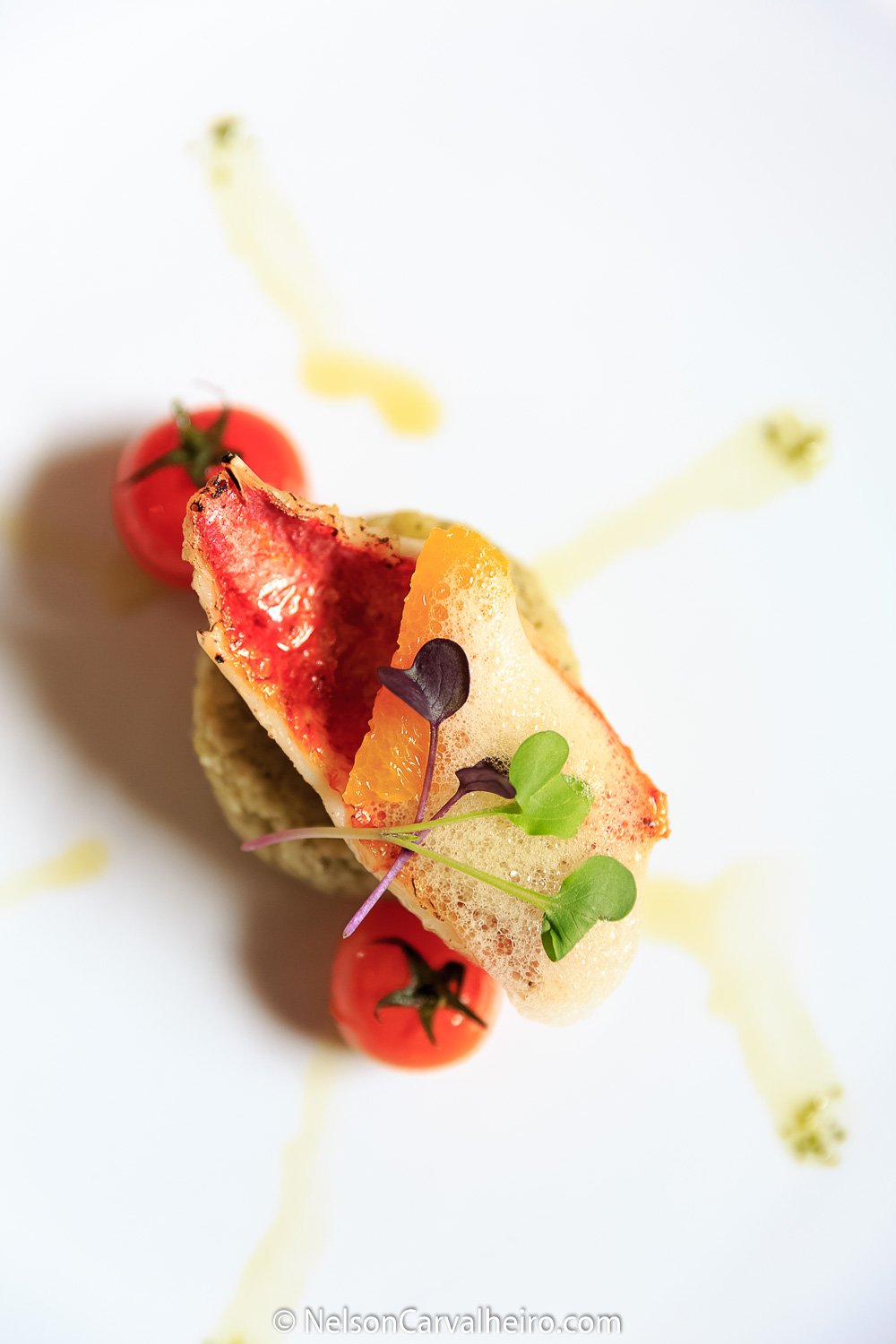
 I made my comments known to Sous Chef Tiago and decided to join him the kitchen as he made my meat course: Mertloenga Veal sirloin, with a farinheira crust, potatoes, and wild mushroom ragout and chestnut confit. The meat was super tender, and this was the first time I had tasted beef from Mertolenga cattle. Very juice. The farinheira added an extra level of smokiness to the place and complemented the softness of the meat. The ragout was also very good, a bit too simple for such a noble cut, but it worked never the less. The chestnut confit was served cold and contrasted the whole dish. Also, it is spring and chestnut is an autumn produce. Overall very good effort by young Sous Chef Tiago Moreno who had to make my lunch happen in no time.
I made my comments known to Sous Chef Tiago and decided to join him the kitchen as he made my meat course: Mertloenga Veal sirloin, with a farinheira crust, potatoes, and wild mushroom ragout and chestnut confit. The meat was super tender, and this was the first time I had tasted beef from Mertolenga cattle. Very juice. The farinheira added an extra level of smokiness to the place and complemented the softness of the meat. The ragout was also very good, a bit too simple for such a noble cut, but it worked never the less. The chestnut confit was served cold and contrasted the whole dish. Also, it is spring and chestnut is an autumn produce. Overall very good effort by young Sous Chef Tiago Moreno who had to make my lunch happen in no time.
Alentejo Best Food&Wine Experiences
As I mentioned in the introduction to this Alentejo Wine Travel Guide, food is an integral part of the wine discovery journey across the Alentejo, so here are the best Food&Wine Experiences offered by the best wineries in the Alentejo
Herdade dos Grous
I arrived at Herdade dos Grous around 18h00 in the afternoon, after my visit to Herdade do Esporão. As with the last two evenings, Wine Tourism in Portugal had set me up with Chef Rui Prado, for a Chef’s Night at the estate’s private wine cellar. I had been thinking that this was the end of day three of my journey, and I was still missing the cover photo for this Alentejo Wine Travel Guide. Taking a look around the main building of the Herdade dos Grous, one can instantly notice that this is one of the most beautiful and well looked after wine estates in the Alentejo. Everything was clean, there are a little garden, flowers and even a view to the estates private (and enormous) lake. This was it, I had found the place for my opening photo of this article, now I just needed to decorate it.
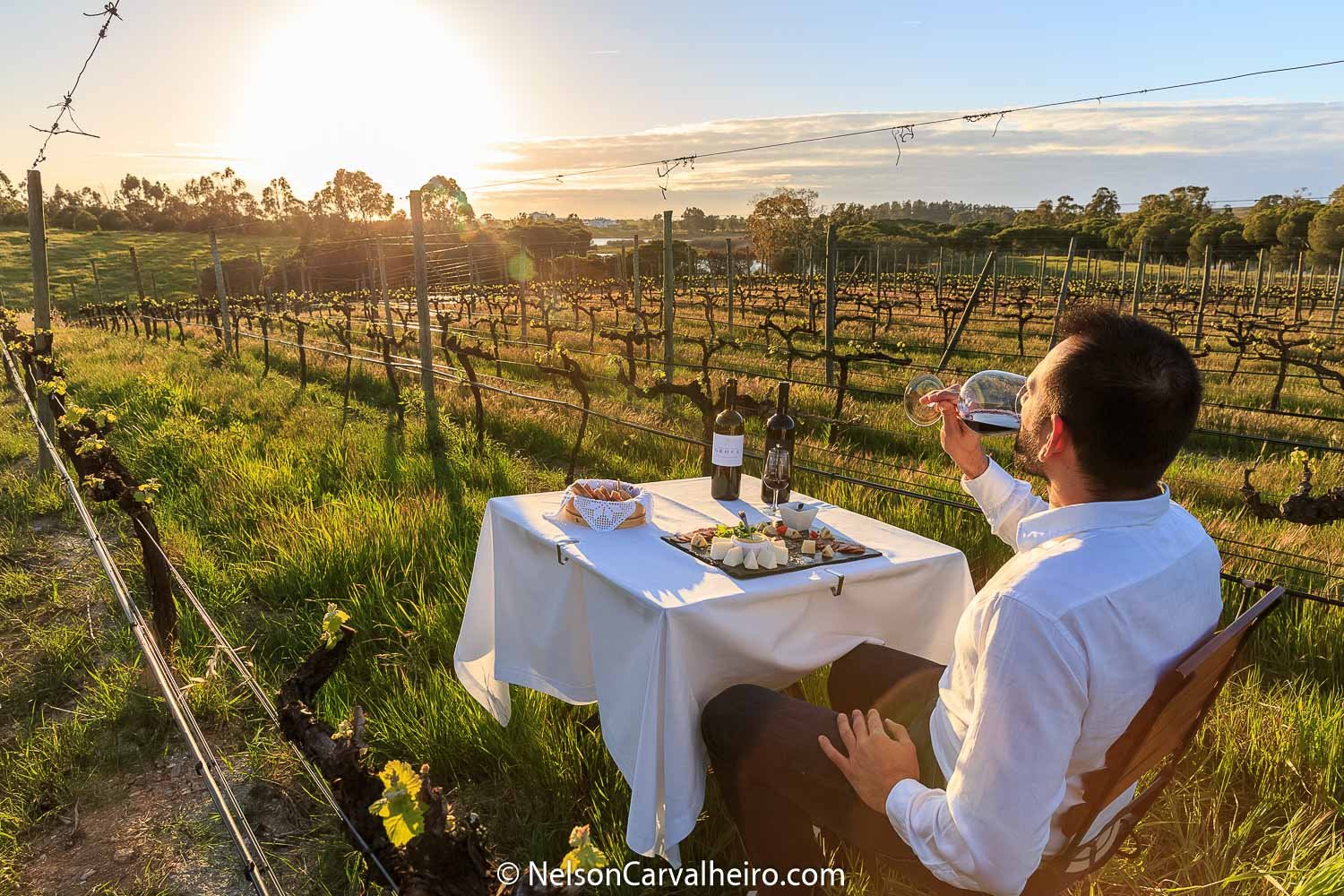
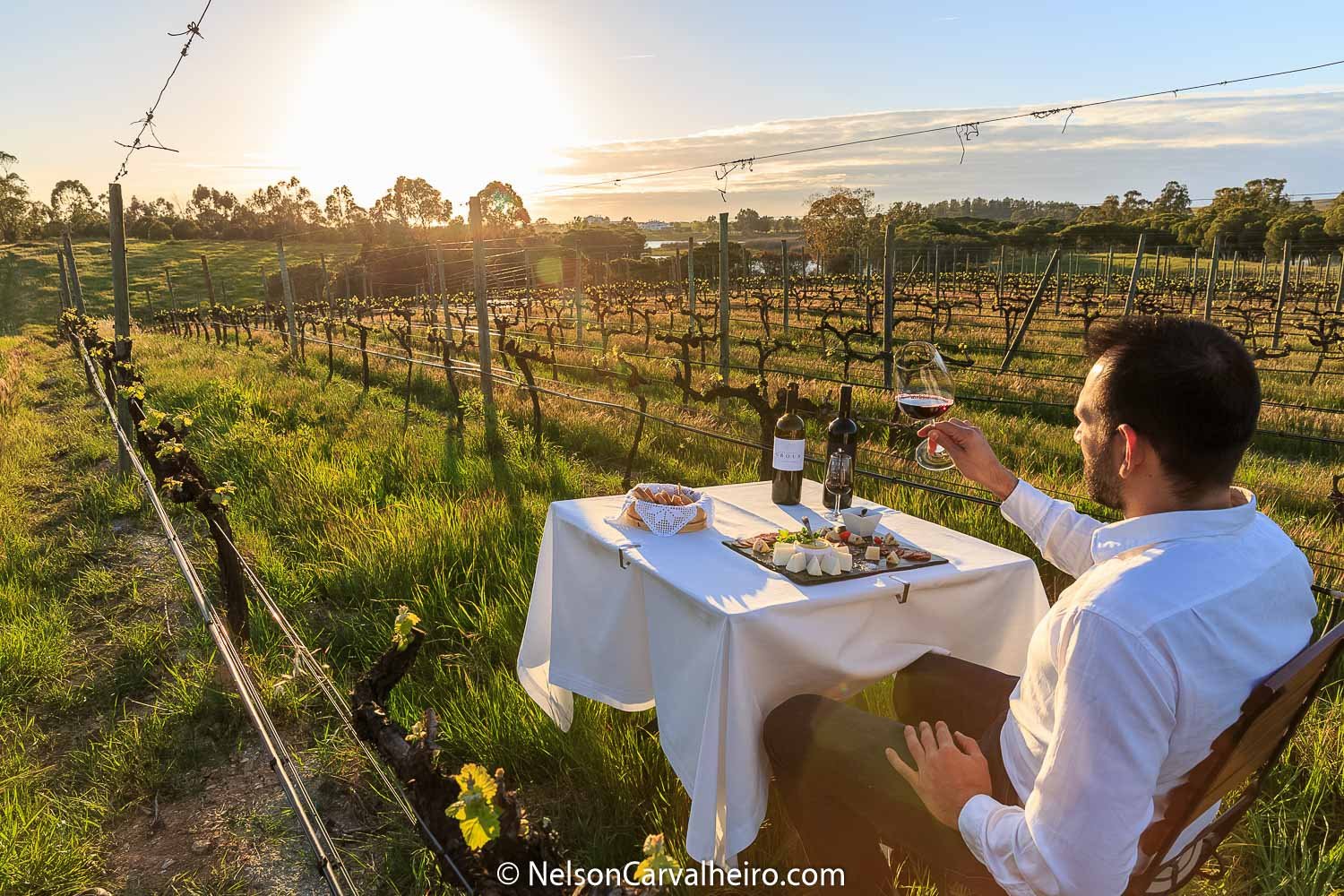 From my experience within the last three days, it became increasingly clear that food is an integral part of the Alentejo when one defines it was a Wine Tourism Destination. It impossible to come her just for the wholesome wines, they have to he enjoyed (not just tasted) with food. This what the locals do, it is part of their culture, and who are we to say otherwise. With this in mind, I asked Chef Rui Prado to prepare a little tasting of Alentejo flavors, that we could both enjoy in the middle of the vineyard. Although none of the estate’s that I have visited in the last days, offers this a bookable experience, I wanted to have it. And as they say, where there is a will, there is a way, and Chef Rui Prado understood me perfectly. Within 10 minutes a selection of the finest cheeses and charcuterie that he had in his dry store was produced and a table place in the middle of the vineyard.
From my experience within the last three days, it became increasingly clear that food is an integral part of the Alentejo when one defines it was a Wine Tourism Destination. It impossible to come her just for the wholesome wines, they have to he enjoyed (not just tasted) with food. This what the locals do, it is part of their culture, and who are we to say otherwise. With this in mind, I asked Chef Rui Prado to prepare a little tasting of Alentejo flavors, that we could both enjoy in the middle of the vineyard. Although none of the estate’s that I have visited in the last days, offers this a bookable experience, I wanted to have it. And as they say, where there is a will, there is a way, and Chef Rui Prado understood me perfectly. Within 10 minutes a selection of the finest cheeses and charcuterie that he had in his dry store was produced and a table place in the middle of the vineyard.

 An excellent choice of wine our little soirée: Herdade dos Grous Reserva 2013, a blockbusting reserve red, with 15º. The kind that punches you in the face at the first try, but then leaves you warm on the inside. I was happy, Chef Rui Prado was happy! Together with the meal I shared at L’AND, these were the two highlights of this trip.
An excellent choice of wine our little soirée: Herdade dos Grous Reserva 2013, a blockbusting reserve red, with 15º. The kind that punches you in the face at the first try, but then leaves you warm on the inside. I was happy, Chef Rui Prado was happy! Together with the meal I shared at L’AND, these were the two highlights of this trip.
 We then headed out to the Private wine cellar for our dinner together. We tasted the natural and unfussed creations of Chef Rui Prado, even though it was his sous-chef handling all the cooking. What I liked the most were the chargrilled pigs ear and 3day toasted Alentejo bread, sprinkled with rough salt and the estates olive oil. This together with the fact that he already adds a few drops of olive white wine vinegar to the vegetable soup we have a starter, reinforced the idea that Chef Rui Prado is looking to impress guests in the palate rather than via presentation.
We then headed out to the Private wine cellar for our dinner together. We tasted the natural and unfussed creations of Chef Rui Prado, even though it was his sous-chef handling all the cooking. What I liked the most were the chargrilled pigs ear and 3day toasted Alentejo bread, sprinkled with rough salt and the estates olive oil. This together with the fact that he already adds a few drops of olive white wine vinegar to the vegetable soup we have a starter, reinforced the idea that Chef Rui Prado is looking to impress guests in the palate rather than via presentation.
Monte da Ravasqueira
Monte da Ravasqueira’s main buildings have located the heart of a secluded valley in Northern Alentejo, close to the city of Arraiolos. Its white washed and blue lined houses could be the subject of a series of postcards of this region. This is how typical they are. Mario Gonzaga, the Wine Tourism Manager from Monte da Ravasqueira, tell me that the estate has 3000 hectares and it belongs to the José de Mello Family since it was purchased in 1947. The José de Mello group is one of Portugal’s biggest corporate groups so, but the family’s foray into winemaking is very recent (the first wines were made in 2001). Besides their wines, they have a great cork production, as 45 hectares are of the vineyard and the rest if for cork, cattle (they have over 700 cattle heads), Black port, olive oil and honey, although these last two are for the estate’s own consumption. In case you like walking, they also have 12 dams within the estate. I would definitely recommend you to try their olive oil. It is light, fruity and a bit spicy. A surprise for me, as the olive oils from the Alentejo, tend to be sweeter.

 For me, the most significant novelty was the wine caviar and wine jelly, made from their greatest achievement, the MR Premium Rosé. This wine is a spectacle and probably my favorite wine from the whole journey. It was only after m first taste that Mario told me that the MR Premium Rosé has been considered for a number of years in a row, the best Portuguese Rosé. A golden color, very traditional of the rosés originating from Provence. Made from the Portuguese Grape, Touriga Nacional it is savory yet fruity, round and yet fresh. And this is exactly what you taste in the caviar and jelly – minus the alcohol of course. So it would only be suited that I tasted this wine with its caviar, a slice of cured sheep Alentejo cheese, black port chorizo and house made Alentejo bread. This my friends, what you see here is the future of Alentejo and in Particular the future of Wine Tourism in Alentejo in a nutshell. The new, modern and international complementing the rooted and centuries traditions of the Alentejo, especially the gastronomical one.
For me, the most significant novelty was the wine caviar and wine jelly, made from their greatest achievement, the MR Premium Rosé. This wine is a spectacle and probably my favorite wine from the whole journey. It was only after m first taste that Mario told me that the MR Premium Rosé has been considered for a number of years in a row, the best Portuguese Rosé. A golden color, very traditional of the rosés originating from Provence. Made from the Portuguese Grape, Touriga Nacional it is savory yet fruity, round and yet fresh. And this is exactly what you taste in the caviar and jelly – minus the alcohol of course. So it would only be suited that I tasted this wine with its caviar, a slice of cured sheep Alentejo cheese, black port chorizo and house made Alentejo bread. This my friends, what you see here is the future of Alentejo and in Particular the future of Wine Tourism in Alentejo in a nutshell. The new, modern and international complementing the rooted and centuries traditions of the Alentejo, especially the gastronomical one.

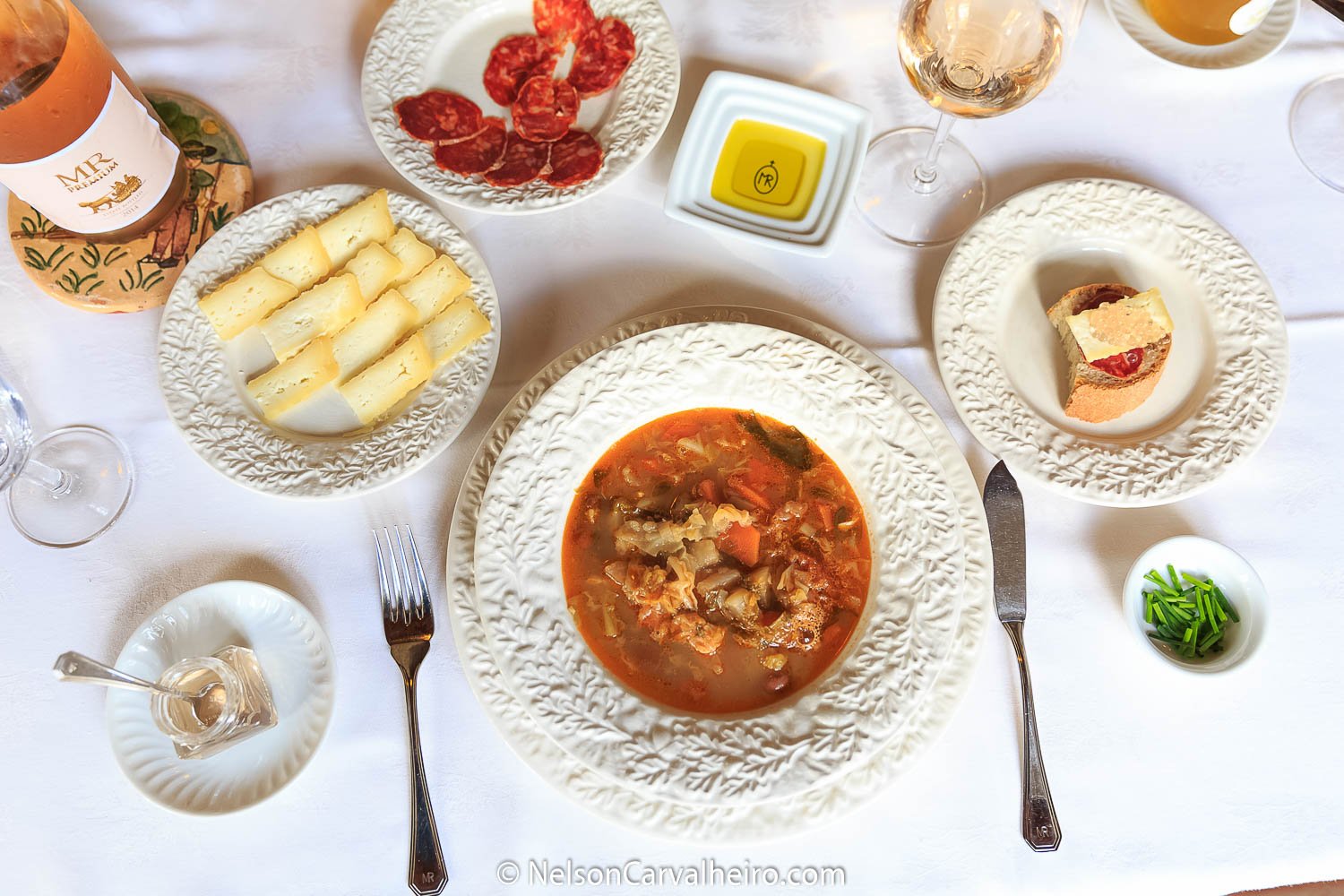 Although they say their biggest asset is the vintage carriage museum (a private collection of carriages drawn by a horse), I happen to believe that it is the gorgeous gardens and belvedere which belong to the family main house which can prove to be their big Wine Tourist lure. I can also tell you, that from all the other estates that I visited in my 4-day tour of the Alentejo, this was certainly the most romantic spot. Cypress trees, a Moorish fountain, a belvedere over the vineyards and the soft green hills of the Northern Alentejo landscape in spring. Looking at the long table under the vine array, one can only imagine Sunday family lunches, with a table full of Alentejo delicacies, glassed filled with wine, and children running around. If there is a moment or place that illustrates this idea of Alentejo being the new Tuscany, this is it!
Although they say their biggest asset is the vintage carriage museum (a private collection of carriages drawn by a horse), I happen to believe that it is the gorgeous gardens and belvedere which belong to the family main house which can prove to be their big Wine Tourist lure. I can also tell you, that from all the other estates that I visited in my 4-day tour of the Alentejo, this was certainly the most romantic spot. Cypress trees, a Moorish fountain, a belvedere over the vineyards and the soft green hills of the Northern Alentejo landscape in spring. Looking at the long table under the vine array, one can only imagine Sunday family lunches, with a table full of Alentejo delicacies, glassed filled with wine, and children running around. If there is a moment or place that illustrates this idea of Alentejo being the new Tuscany, this is it!
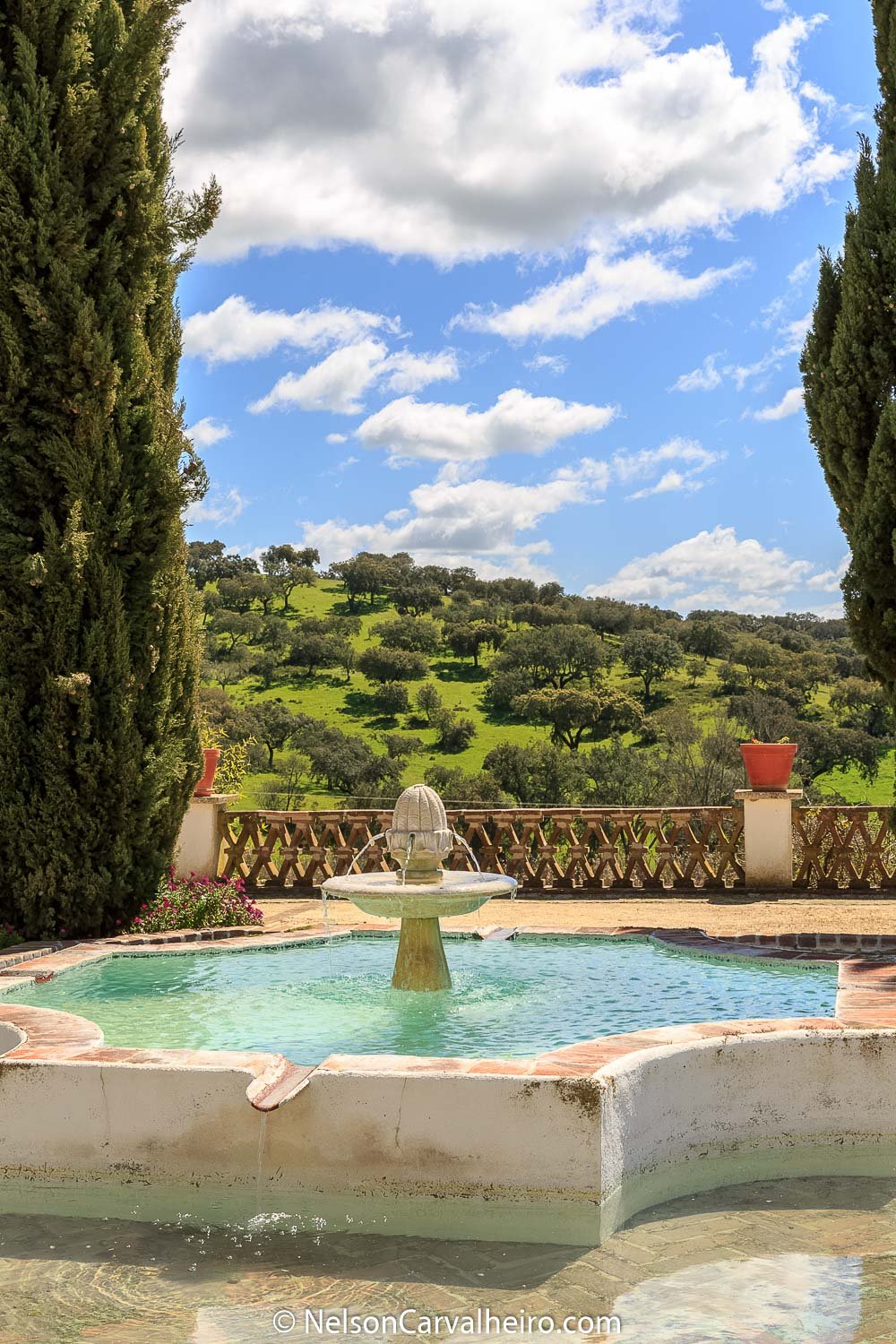
 Unfortunately, it wasn’t Sunday, and there were no José de Mello Family members around to have lunch with me, so I had to settle for the estate’s lunch room. Rivaling local restaurants in its decoration and atmosphere, it is here that the Monte da Ravasqueira can enjoy Northern Alentejo Specialties, cooking by the old ladies which harbor the traditional Alentejo flavors and cuisine knowledge. The best thing about it is that there is nothing fancy about the meal. It is just farm food, made to feed the hungry workers. And although they do not join us at the table (this room is only for the senior staff and the visitors) the rustic flavors are all there. Apart for the first bites I mentioned earlier, we had farm soup packed with cabbage, red beans, carrot, potato, onion, garlic, and tomatoes. Even though there was roasted salt cod for main, I honestly recommend that you take two plates full of this soup and save some space for the Brulee which comes as dessert. As one would expect, this is caramelized with a hot iron, instead of a blowtorch…Heaven.
Unfortunately, it wasn’t Sunday, and there were no José de Mello Family members around to have lunch with me, so I had to settle for the estate’s lunch room. Rivaling local restaurants in its decoration and atmosphere, it is here that the Monte da Ravasqueira can enjoy Northern Alentejo Specialties, cooking by the old ladies which harbor the traditional Alentejo flavors and cuisine knowledge. The best thing about it is that there is nothing fancy about the meal. It is just farm food, made to feed the hungry workers. And although they do not join us at the table (this room is only for the senior staff and the visitors) the rustic flavors are all there. Apart for the first bites I mentioned earlier, we had farm soup packed with cabbage, red beans, carrot, potato, onion, garlic, and tomatoes. Even though there was roasted salt cod for main, I honestly recommend that you take two plates full of this soup and save some space for the Brulee which comes as dessert. As one would expect, this is caramelized with a hot iron, instead of a blowtorch…Heaven.
 What look for in a Monte da Ravasqueira Wine? Deputy winemaker Vasco Rosa Santos, the right-hand man of Pedro Pereira Gonçalves, who was recently honored as ” Young Winemaker of the Year “, showcases a magnum bottle of Monte da Ravasqueira Reserva red 2013. He tells me that this super premium range of Monte da Ravasqueira is the result of a thorough analysis of the vineyard, which resulted in the selection of special blocks of varieties that stood out for its elegance, concentration and character. A wine that joins Touriga Nacional (40%) and Syrah (60%) specially harvested from selected plots by hand to 20kg boxes and kept at 0°C for 24h. Fermented at different temperatures in order to enhance the varietal character, aged separately in new French oak barrels for 12 months. Tasting notes Dense red color and deep violet. Nose of great elegance and complexity with black fruit notes integrated oak and spicy. In the taste reveals the same profile of elegance with very fine tannins, long and chewable. Chocolate notes and mineral notes marked integrated with notes of oak barrels and earthy, floral and licorice.
What look for in a Monte da Ravasqueira Wine? Deputy winemaker Vasco Rosa Santos, the right-hand man of Pedro Pereira Gonçalves, who was recently honored as ” Young Winemaker of the Year “, showcases a magnum bottle of Monte da Ravasqueira Reserva red 2013. He tells me that this super premium range of Monte da Ravasqueira is the result of a thorough analysis of the vineyard, which resulted in the selection of special blocks of varieties that stood out for its elegance, concentration and character. A wine that joins Touriga Nacional (40%) and Syrah (60%) specially harvested from selected plots by hand to 20kg boxes and kept at 0°C for 24h. Fermented at different temperatures in order to enhance the varietal character, aged separately in new French oak barrels for 12 months. Tasting notes Dense red color and deep violet. Nose of great elegance and complexity with black fruit notes integrated oak and spicy. In the taste reveals the same profile of elegance with very fine tannins, long and chewable. Chocolate notes and mineral notes marked integrated with notes of oak barrels and earthy, floral and licorice.
Private Carriage Museum of Monte da Ravasqueira
As part of its wine tourism project, Monte da Ravasqueira has a large private collection of harnesses and carriages of various eras and styles. The Carriage Driving Museum is also a way of recalling the fact that the 1996 World Carriage Driving Championship was won by Félix Brasseur, with Falcão, Fogoso, Favorito and Fraque, Lusitanian thoroughbreds from the stud farm that existed for many years on Monte da Ravasqueira.
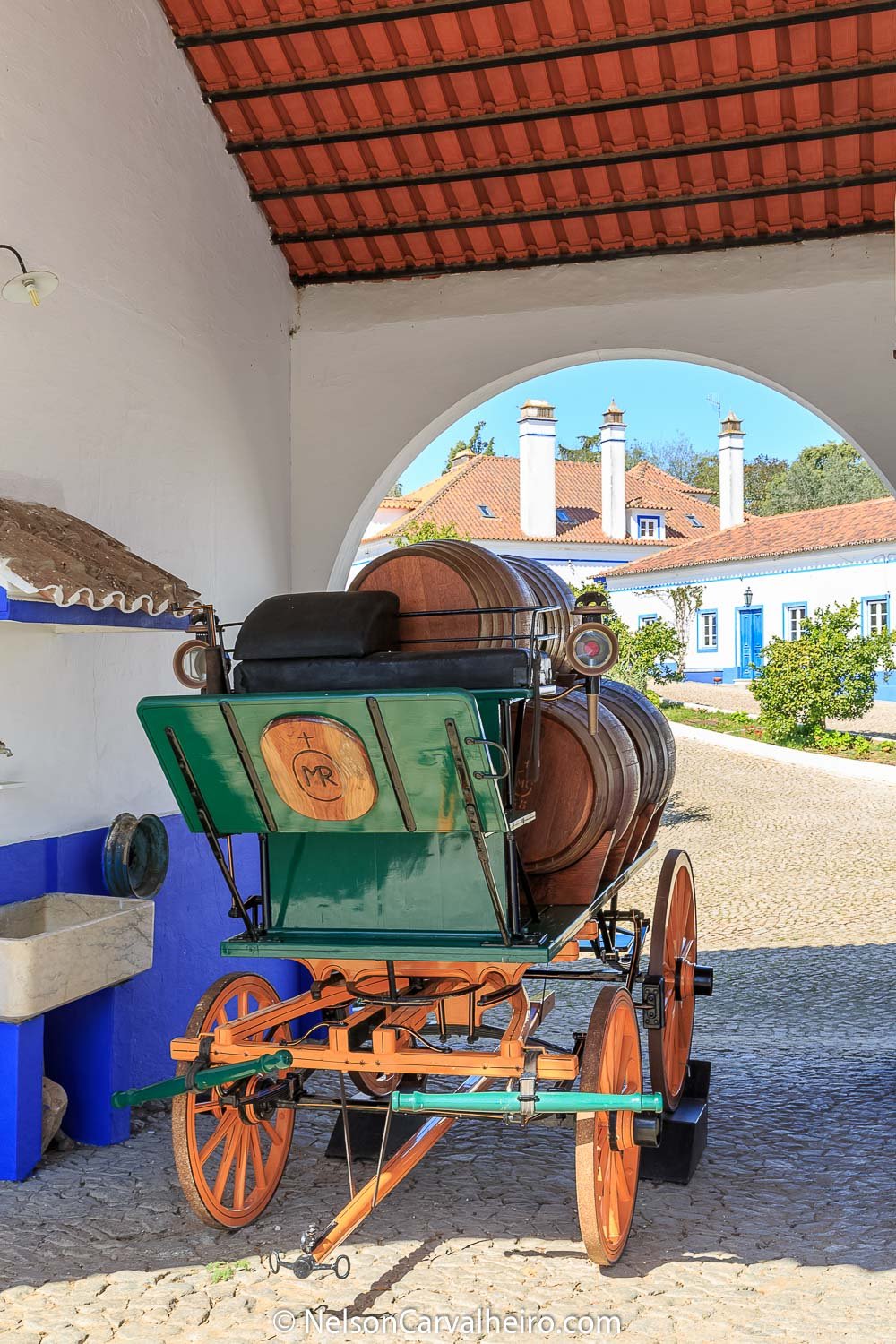 Adega Mayor
Adega Mayor
Even if your GPS fails to direct you to Adega Mayor, the scent of coffee roast will let you know that you are in the vicinity of one of Alentejo’s most Avant guard wineries. Set up in the land around the Delta coffee roasting factory in the outskirts of Campo Maior, Adega Mayor is yet another prodigal child of the genius of Rui Nabeiro, Portugal’s most well-respected businessman. He is widely known for overstaffing his companies and overpaying his employees, just because he has the money and is a serious social welfare advocate. The fact of the matter is that all this compassion can be tasted in the Adega Mayor wines. Portuguese Soulful wines from Handpicked grapes almost all originating from autochthonous Alentejo varieties. Set on a 350 hectares area of holm oaks, riparian corridors, and agricultural land, the Winery enjoys all the advantages of the Mediterranean ecosystem and is an agricultural area with a strong tradition in vineyards and olive groves cultures.

 Adega Mayor is an architectural reference worldwide that distinguishes and elevates the wine heritage of the region of Alentejo. It is a unique place in the Portuguese scene, designed by the architect Álvaro Siza Vieira, a tribute to the architecture of wine and life. It can look like a monolith when one looks at it from the distance, but it is its “squareness” that so majestically contrasts with the overwhelming round shapes that surround it. Tiago Correia, the wine tourism manager tells me that the inception for the shape and feel of the Adega Mayor was drawn on a paper napkin, when Rui Nabeiro meets Siza Vieira for lunch and detailed him his wish to build something that would stand out from the Alentejo planes. The union of ideas was bonded from the get go.
Adega Mayor is an architectural reference worldwide that distinguishes and elevates the wine heritage of the region of Alentejo. It is a unique place in the Portuguese scene, designed by the architect Álvaro Siza Vieira, a tribute to the architecture of wine and life. It can look like a monolith when one looks at it from the distance, but it is its “squareness” that so majestically contrasts with the overwhelming round shapes that surround it. Tiago Correia, the wine tourism manager tells me that the inception for the shape and feel of the Adega Mayor was drawn on a paper napkin, when Rui Nabeiro meets Siza Vieira for lunch and detailed him his wish to build something that would stand out from the Alentejo planes. The union of ideas was bonded from the get go.

 With the freedom and limitless space to build a modern Winery, Adega Mayor is a hymn to modern wine making techniques and winery functionality. Of all the areas, there are two which deserve to be featured. The main hangar of the winery where all the aging process takes place and the terrace, designed in the shape of Mr. Nabeiro’s face. Within the aging hangar, I played around with one of the old 5-liter wine vessels, which the workers took to the fields and tasted the entry level white from the Adega Mayor’s production: The Caiado. Made from Verdelho, Arinto and Antão Vaz it is fresh, crystalline wine with a citrine color and plenty of minerality. A simple and easy wine made to drink amongst friends around the pool on a hot summer afternoon.
With the freedom and limitless space to build a modern Winery, Adega Mayor is a hymn to modern wine making techniques and winery functionality. Of all the areas, there are two which deserve to be featured. The main hangar of the winery where all the aging process takes place and the terrace, designed in the shape of Mr. Nabeiro’s face. Within the aging hangar, I played around with one of the old 5-liter wine vessels, which the workers took to the fields and tasted the entry level white from the Adega Mayor’s production: The Caiado. Made from Verdelho, Arinto and Antão Vaz it is fresh, crystalline wine with a citrine color and plenty of minerality. A simple and easy wine made to drink amongst friends around the pool on a hot summer afternoon.

On the “upper deck” I was hosted for an outdoor picnic, filled with northern Alentejo food goodies; mini chicken pies, wild asparagus quiche, an assortment of chorizos hams and cheeses, pumpkin, blueberry and quince jams from the estate’s own fruits, and the Alentejo staples: Alentejo bread and the sericaia dessert. The top of Winery is actually a large terrace covered in grass (the living kind, not the fake one), which a water feature in the middle (not a pool) and some benches along the way. All these features have a both aesthetic and temperature control function for the winery bellow. Also, as we are on the top of the highest hill of the estate we can get a comfortable view of the vastness of the Northern Alentejo planes and the horizon that so distinctively brands this region.
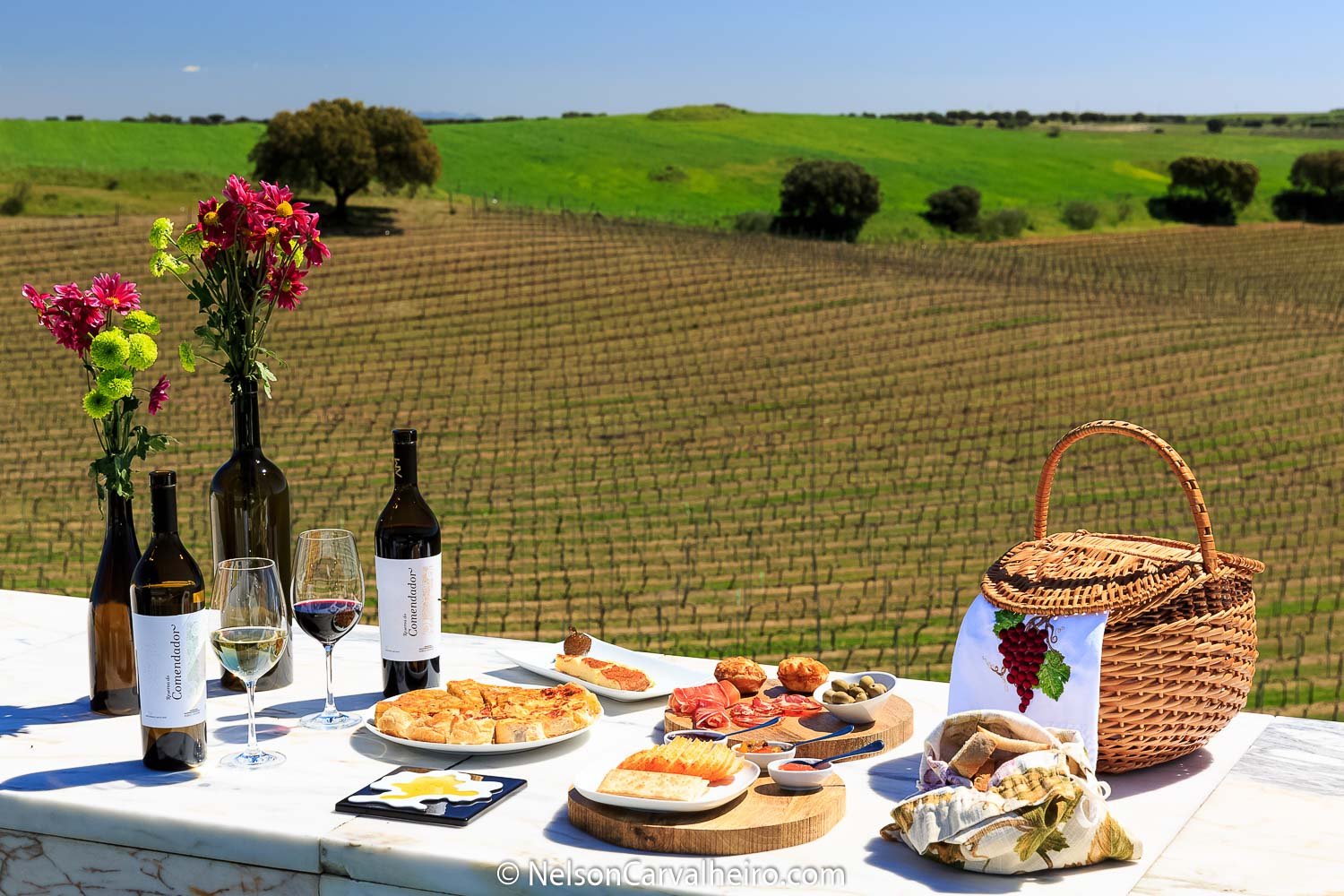 From here, we can also gaze at the Serra de São Mamede, a small mountain range close to Adega Mayor, which contributes as a temperature buffer and adds to the relative coolness of the Adega Mayor Wines. My wine of choice for our picnic was the Reserva do Comendador 2011 made from Alicante Bouschet, Syrah, and Touriga Nacional grapes. An elegant and refined companion for a large array of strong cheeses and roasted meat dishes.
From here, we can also gaze at the Serra de São Mamede, a small mountain range close to Adega Mayor, which contributes as a temperature buffer and adds to the relative coolness of the Adega Mayor Wines. My wine of choice for our picnic was the Reserva do Comendador 2011 made from Alicante Bouschet, Syrah, and Touriga Nacional grapes. An elegant and refined companion for a large array of strong cheeses and roasted meat dishes.
Herdade do Sobroso
Herdade do Sobroso is made up of a colossal 1600 hectares of lower Alentejo territory. I am saying territory and not land, because, within this area, the estate has its own “mountain range”, wildlife reserve, lakes, an Iberian pine forest, a part of the Guadiana river and 52 hectares of vineyards. These are all planted next to the river and on the flatter and more accessible parts of the estate. Everything else if pure wilderness. Located in the Vidigueira municipality of Alentejo, Herdade do Sobroso is bordered by the Serra de Mendro to the north, by the River Guadiana to the east and to the south by a vast plain that extends until the eye can see. Even though it was a cloudy day when I visited Herdade do Sobroso (April 2016) I could not help myself to be amazed at just how vast this property was and more strikingly that it actually belongs to someone and not the state. A very present reminder of the times when the whole Alentejo was ruled by feudal lords and their mini kingdoms. Other examples featured in this guide are the Herdade do Esporão with its 1800 hectares (450 vineyard and 80 olive orchards) and the former extension of the Torre de Palma estate which stretched over 3000 hectares and encompassed several villages.


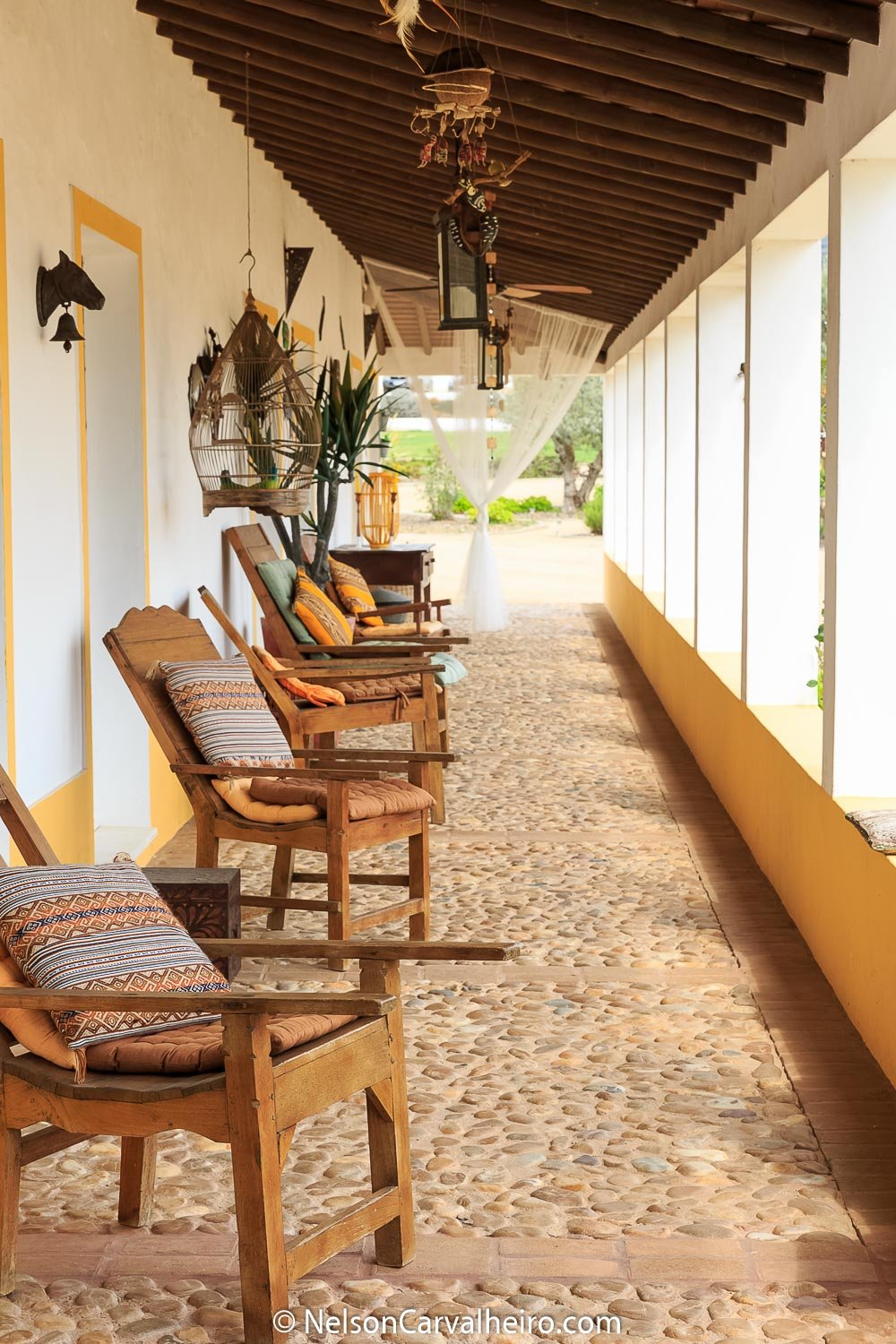 I was taken on a tour of the property by Filipe Teixeira Pinto, the owners son in law and chief winemaker of Herdade do Sobroso. The jeep took about 45min to cross the estate’s small mountain range to ultimately reach its highest point where we could have a 360 view of the property. To the southeast lies the frontier of the property along the shores of the Guadiana River and above those Spain (60km away). On the distant and start south, one can see the city of Beja (45km away). To the north, Herdade do Sobroso still reaches for another 7km. During our almost 2h long Jeep expedition through the property, Filipe goes on to explain to me how his father in law, Mr. António Ginestal Machado, a renowned architect from Porto, bought the property where he could have his own private hunting ground and make his own wine. The purchase happened in 2001 and the first wines were released in 2008 from the harvest made in 2006. In the meantime, they also converted the estates old worker’s cottages into a boutique 11 room hotel, all with views to the amazing solitude of the estate’s magnitude.
I was taken on a tour of the property by Filipe Teixeira Pinto, the owners son in law and chief winemaker of Herdade do Sobroso. The jeep took about 45min to cross the estate’s small mountain range to ultimately reach its highest point where we could have a 360 view of the property. To the southeast lies the frontier of the property along the shores of the Guadiana River and above those Spain (60km away). On the distant and start south, one can see the city of Beja (45km away). To the north, Herdade do Sobroso still reaches for another 7km. During our almost 2h long Jeep expedition through the property, Filipe goes on to explain to me how his father in law, Mr. António Ginestal Machado, a renowned architect from Porto, bought the property where he could have his own private hunting ground and make his own wine. The purchase happened in 2001 and the first wines were released in 2008 from the harvest made in 2006. In the meantime, they also converted the estates old worker’s cottages into a boutique 11 room hotel, all with views to the amazing solitude of the estate’s magnitude.

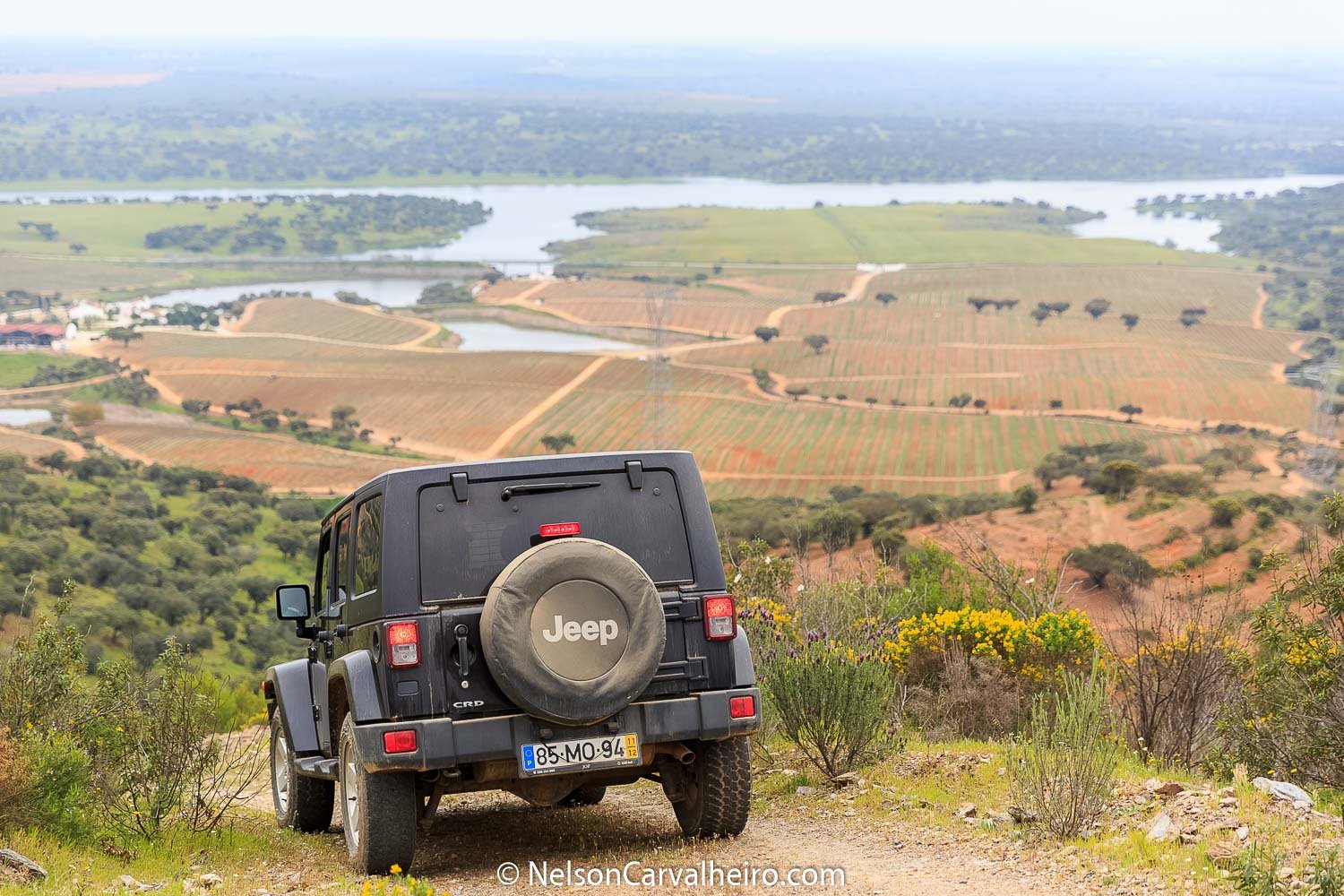 In its 4,000 acres of diversified land, Herdade do Sobroso offers unique hunting routes. At the Serra do Mendro, the more demanding hunters can rest assured of maximum quality regarding both the service and the variety of huntable species. The environment is wild and has a charming natural beauty. There are several large animals in the Alentejo forest, such as deer, fallow deer, mouflons, and wild boars. Alentejo has this much to offer. With such a land, you will find it hard to leave. Herdade do Sobroso is known for having an open clay, sandy soil, which ensures that the design of the vineyards matches the toughest criteria. This guarantees the production of the highest quality grapes. Regarding the climate, this region is known for its cold winters, followed by long, hot summers. The main red grape varieties are Aragonez, Alicante Bouschet, Cabernet Sauvignon, Syrah, Alforcheiro, Tinta Grossa and Trincadeira, while the white wines essentially come from the Antão Vaz, Perrum (both original from Vidigueira) and Arinto grape varieties.
In its 4,000 acres of diversified land, Herdade do Sobroso offers unique hunting routes. At the Serra do Mendro, the more demanding hunters can rest assured of maximum quality regarding both the service and the variety of huntable species. The environment is wild and has a charming natural beauty. There are several large animals in the Alentejo forest, such as deer, fallow deer, mouflons, and wild boars. Alentejo has this much to offer. With such a land, you will find it hard to leave. Herdade do Sobroso is known for having an open clay, sandy soil, which ensures that the design of the vineyards matches the toughest criteria. This guarantees the production of the highest quality grapes. Regarding the climate, this region is known for its cold winters, followed by long, hot summers. The main red grape varieties are Aragonez, Alicante Bouschet, Cabernet Sauvignon, Syrah, Alforcheiro, Tinta Grossa and Trincadeira, while the white wines essentially come from the Antão Vaz, Perrum (both original from Vidigueira) and Arinto grape varieties.
 Vidigueira as a wine producing region has been mostly connected with the production of white wines from the Antão Vaz and Perrum grapes. “It was actually a white wine from Vidigueira that became the first ever Portuguese wine to win an international award at the Paris World Exhibition of 1900, “says Filipe. “We want to expand our vineyard area and we are committed doing so only using Portuguese varieties. The market is very thirsty for novelty grapes and Portugal has a huge variety to answer this demand. So, I am looking for specialty Portuguese grapes which have a UAU factor and can make the Wines from Herdade do Sobroso stand out from the competition like Touriga Franca and Tinta Miúda. All their red wines (across the whole range) have Alicante Bouschet.
Vidigueira as a wine producing region has been mostly connected with the production of white wines from the Antão Vaz and Perrum grapes. “It was actually a white wine from Vidigueira that became the first ever Portuguese wine to win an international award at the Paris World Exhibition of 1900, “says Filipe. “We want to expand our vineyard area and we are committed doing so only using Portuguese varieties. The market is very thirsty for novelty grapes and Portugal has a huge variety to answer this demand. So, I am looking for specialty Portuguese grapes which have a UAU factor and can make the Wines from Herdade do Sobroso stand out from the competition like Touriga Franca and Tinta Miúda. All their red wines (across the whole range) have Alicante Bouschet.
Lunch at Herdade do Sobroso
A combination of earthy flavors which reminds me of the land that characterizes the Herdade do Sobro. Melted sheep cheese with oreganos went particularly well with the Sobro Rosé 2014 served at lunch.
Herdade do Esporão
Herdade do Esporão requires no introductions, even to first timers in Portugal Wine Travelling. They are the Portuguese Wine Brand with the most notable recognition overseas, after the immortal (for the good or the bad) Mateus Rosé. Although Portugal is being better represented nowadays, for many years, they are the only Portuguese wine being sold in any world class bodegas in the USA. Together with their olive oil, Esporão was a symbol for Alentejo and Portugal. This dominance over the Portuguese wine representation is clearly visible in their production volume: a whopping 12 million liters per year from almost 500 hectares of planted vineyard.


It is this vastness of vineyard that you travel through, as you pass the gate of the estate and make your way into the visitor’s center by the waters of the Alqueva lake. I have to say it is quite impressive to be driving for almost 10 minutes by car and seeing row after row after row of vineyards in every direction. Now the big difference is that if this was Chilli, Argentina, South Africa or Australia, these large production volumes would implicate below par wine, but this is Portugal and Mr. David Baverstock (the Portuguese/Australian Chief WineMaker at Herdade do Esporão) does not play around. During my visit to Herdade do Esporão, I had the opportunity to try their 5 newest wine from the 2015 harvest which has just been released a couple of weeks ago. I was amazed at the range of high quality that I was presented with. I will highlight the two wines which impressed me the most, the Verdelho 2015 and the Amphora wine 2015.
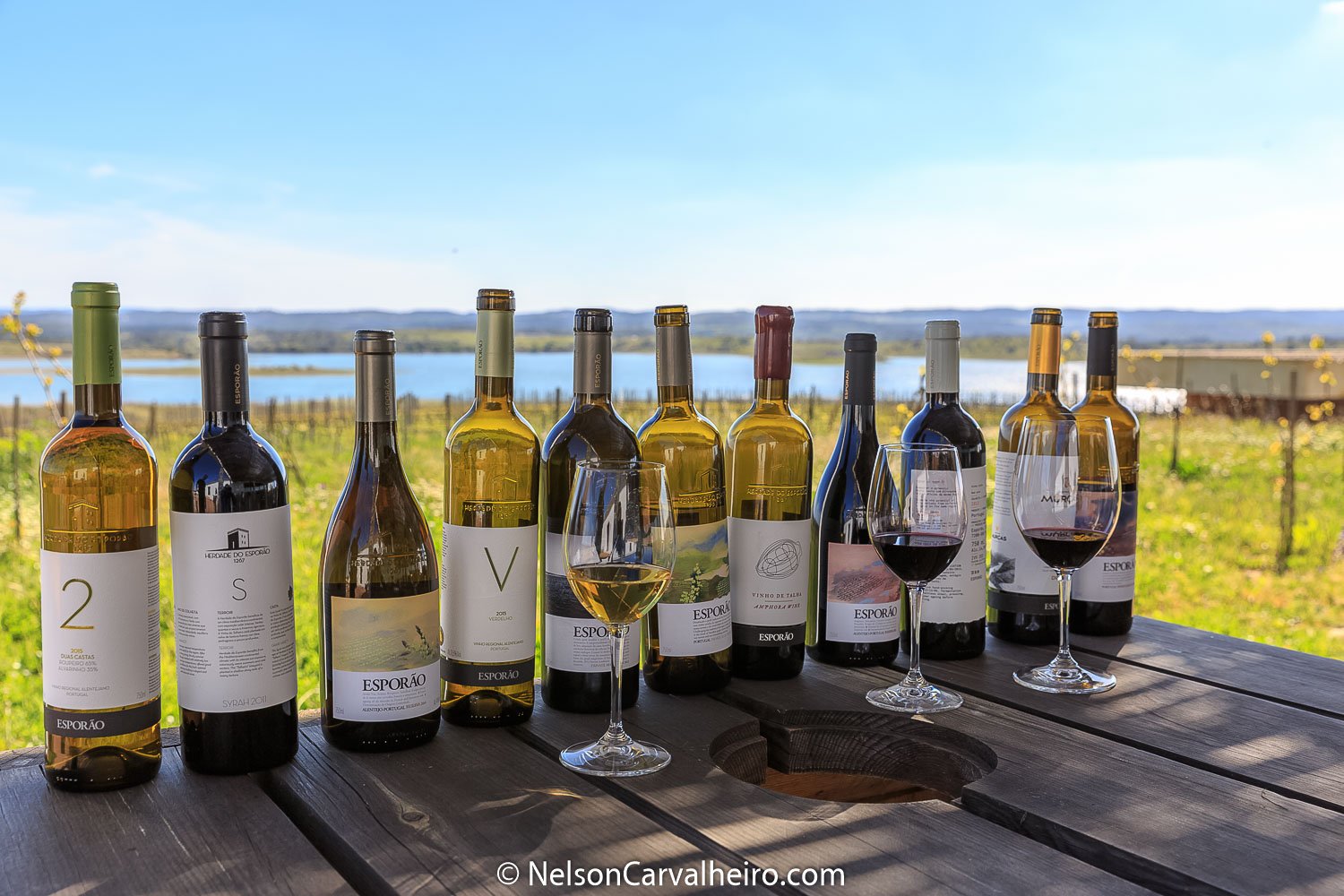 The latter because they have dared to take the 2000-year-old amphora wine making process introduced by the Romans in the Iberian Peninsula, which is still widely used across the whole interior Alentejo and made a red wine which is different from anything you tasted before. It’s natural fermentation occurs in clay pots with resin lining, they have extended skin maceration. It has a deep rustic and smoky taste, almost of leather. It is when you taste an “unmodernized” wine like this, that you realized how the wine made by our ancestors must have tasted like, and just how much more quality wine is produced today thanks to all the technological advances in winemaking. The red lacquer bottle top, adds to the drama of opening such an “antique wine”.
The latter because they have dared to take the 2000-year-old amphora wine making process introduced by the Romans in the Iberian Peninsula, which is still widely used across the whole interior Alentejo and made a red wine which is different from anything you tasted before. It’s natural fermentation occurs in clay pots with resin lining, they have extended skin maceration. It has a deep rustic and smoky taste, almost of leather. It is when you taste an “unmodernized” wine like this, that you realized how the wine made by our ancestors must have tasted like, and just how much more quality wine is produced today thanks to all the technological advances in winemaking. The red lacquer bottle top, adds to the drama of opening such an “antique wine”.

The Verdelho 2015 is a wine that somehow represents the year of 2015 in the wines made in Herdade do Esporão. As it is a white monovarietal wine, of the year, is good, then the Verdelho will reach its full potential and make an extraordinary wine as is 2015 that I tasted. Fresh, elegant, tight palate with mineral notes and a long finish with cleansing acidity. Herdade do Esporão does not produce too much of it, so they are used to emptying its stock half a year after it was put on the market. Maybe the fact that it keeps getting recognized in wine competitions across the world and the 2014 edition having won the Best Portuguese Wine in 2015 competition have helped its cause. Verdelho is a grape variety original from Madeira island which has adapted extremely well to the Alentejo.
Alentejo Best Wineries
Herdade dos Grous
The cellar Herdade do Grous has the guidance of the renowned oenologist Luís Duarte. He is responsible for the making of the best wines of this farm. My favorite wine of Herdade dos Grous – Herdade dos Grous Reserva 2013 (Red)
 Monte da Ravasqueira
Monte da Ravasqueira
Connected to José de Mello’s family for several generations, Monte da Ravasqueira is located in the municipality of Arraiolos, one hour away from Lisbon, and covers a vast area of the typical Alentejo landscape. My favorite wine of Monte da Ravasqueira – MR Premium 2013 Rosé.
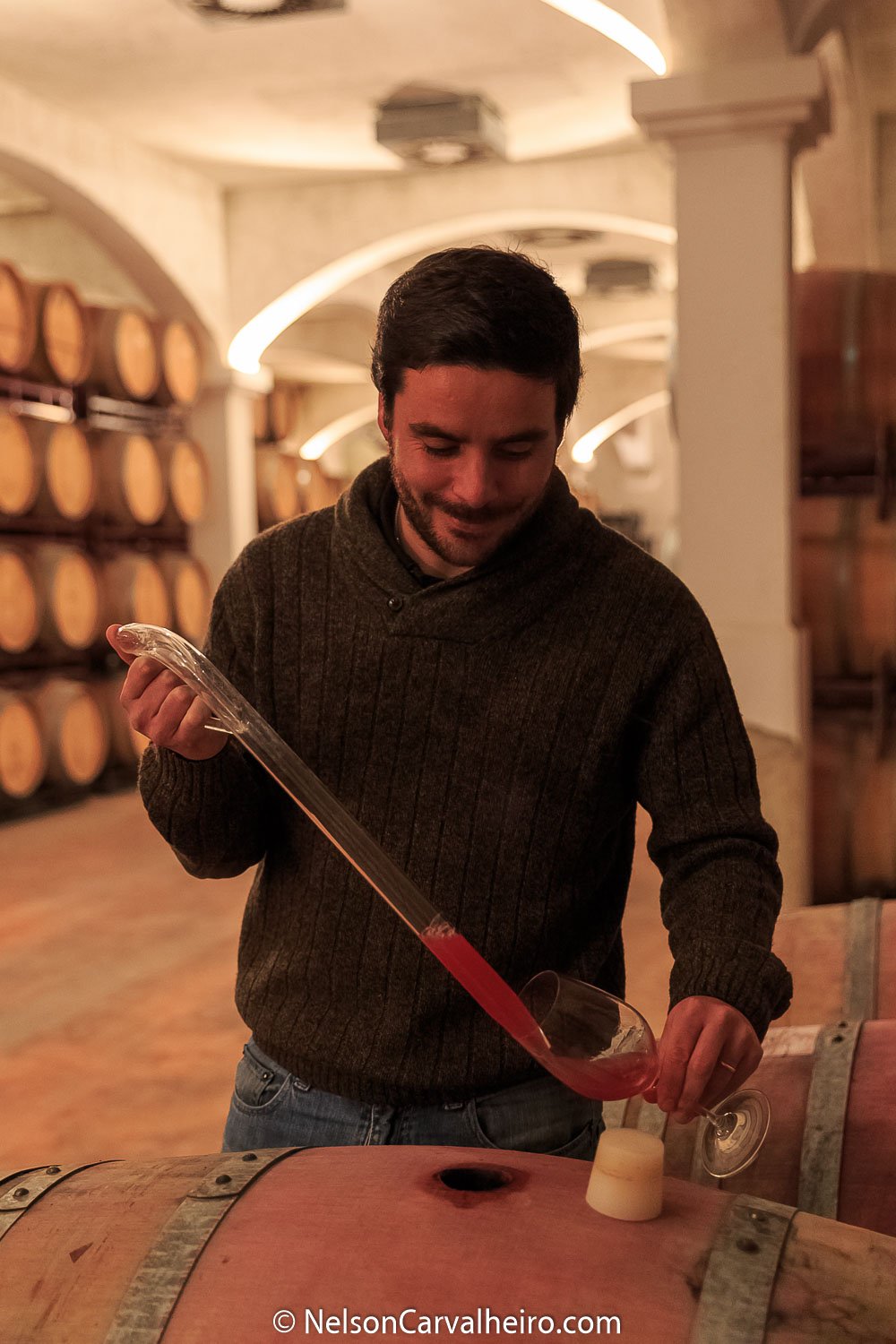
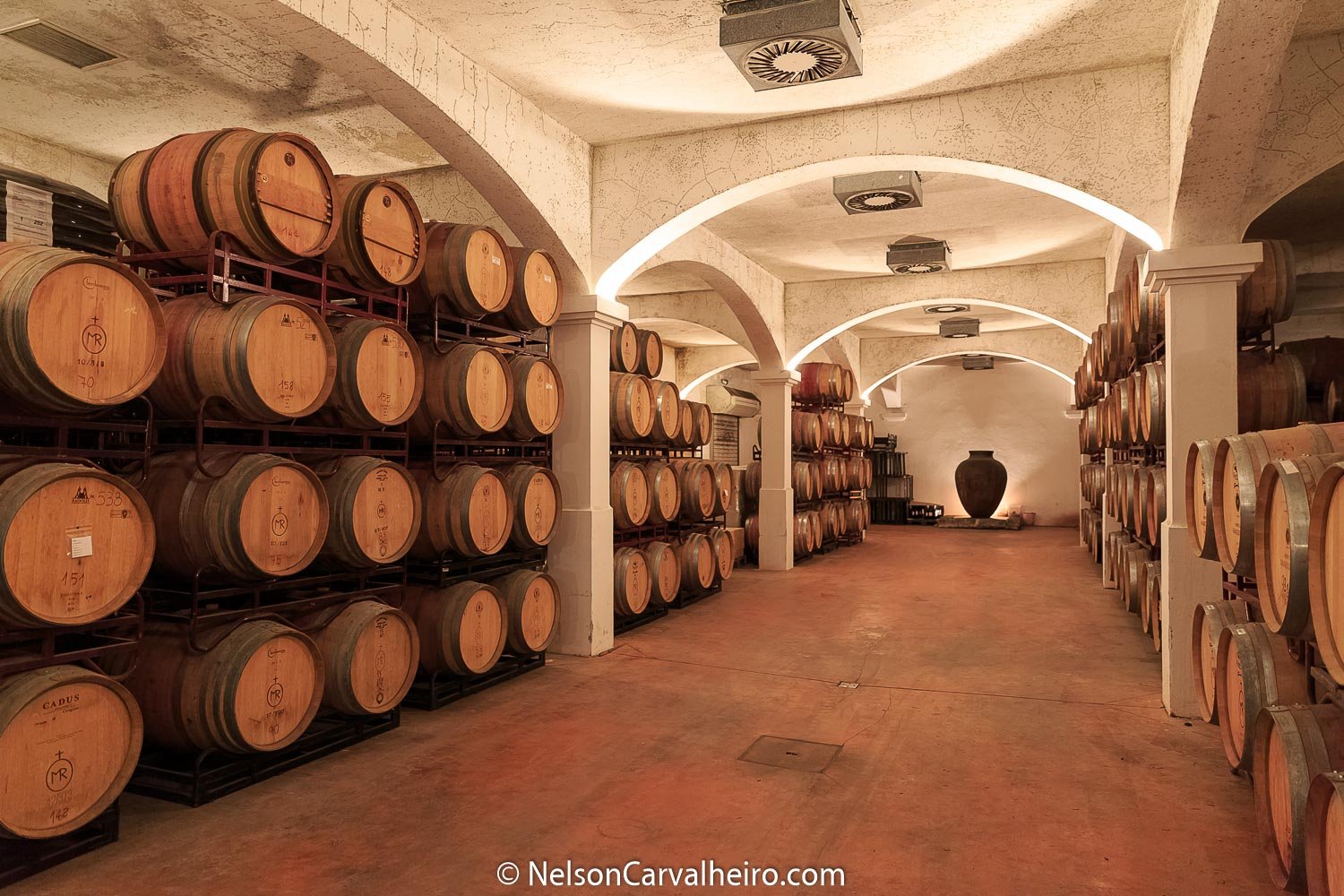 Adega Mayor
Adega Mayor
In the beautiful and untouched landscape of the Alentejo plains of Campo Maior, the architect Siza Vieira created an original building, a horizontal whitewashed volume. The wines of Adega Mayor have obtained, at the national and international level, a unanimous recognition from critics having conquered over 100 awards already. My favorite wine of Adega Mayor – Reserva do Comendador 2011 (Red)

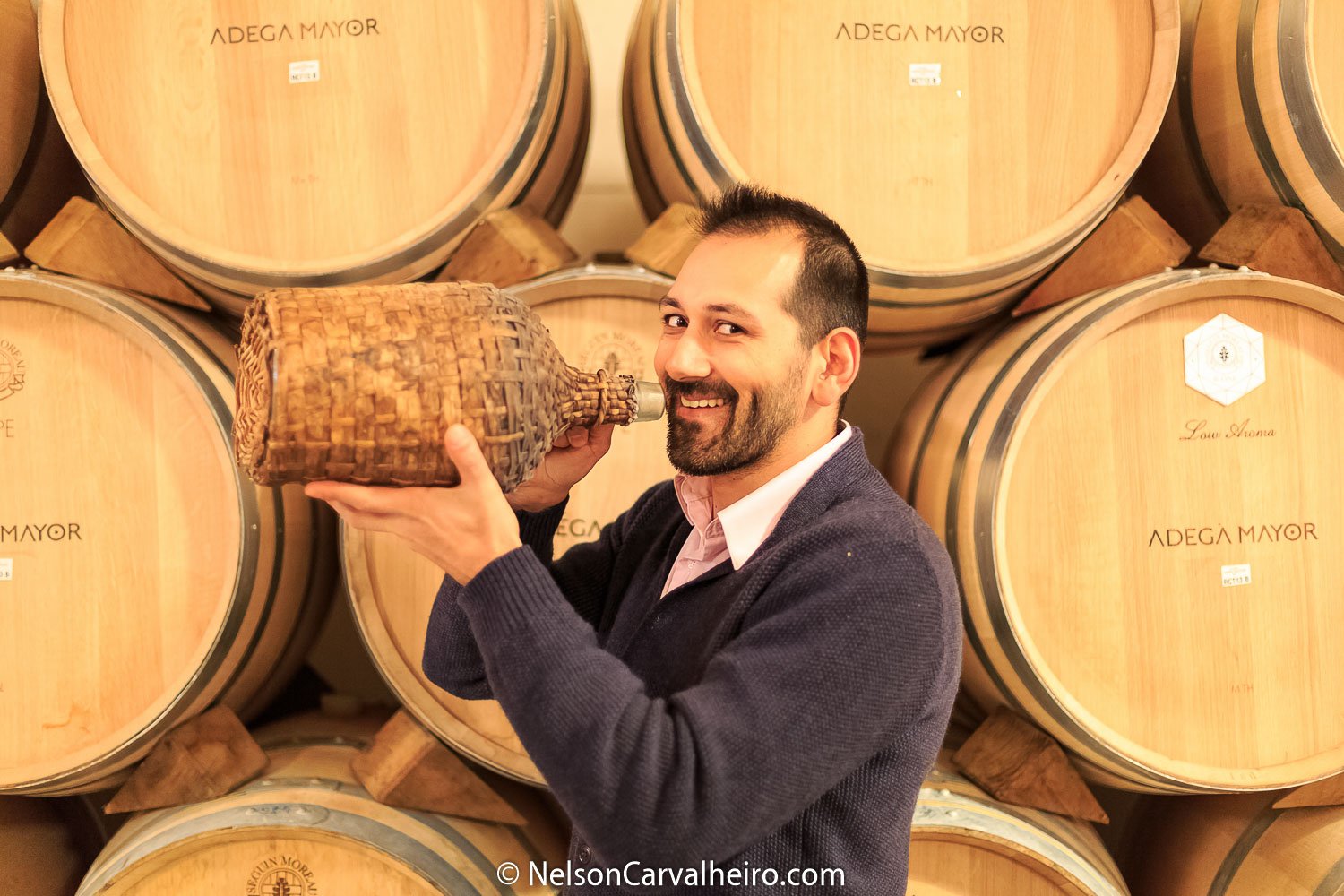 Herdade da Malhadinha Nova
Herdade da Malhadinha Nova
The Cellar of Malhadinha Nova is traditional and sophisticated and brings together a unique set of characteristics favorable for the production of distinctive wines of the highest quality. My favorite wine from Herdade da Malhadinha Nova – Monte da Peceguinha 2014 (White)
Herdade do Esporão
The Herdade do Esporão presents itself as an Estate steeped in history, producer of outstanding quality wines. The Esporão vines are located in the heart of Reguengos de Monsaraz, where wines are more balanced and seductive, simultaneously thriving and pleasant, luxuriant and with a good aging potential. My favorite wine from Herdade dos Esporão : Verdelho 2015 (White)
Also of Interest in Alentejo
Forte da Graça Stronghold in Elvas
At the top of the hill where, since 1482 there was a chapel of Our Lady of Grace, founded by the great-grandmother of Vasco da Gama, it was considered fundamental to shut the defensive circuit of Elvas square. The Count himself Lippe was in charge of designing the fort that was begun in 1763. The effectiveness of this strong, that held about 80 mouths fire and was considered impregnable, required for its defense from 1000 to 1200 infantrymen, 200 100 artillerymen, and miners. Wells circling fortification and underground galleries, driving some out of the fortress, are some of the elements that are equipped with the complex defense systems that have been designed and are in Lippe Fort. It is really a masterpiece, considered a pinnacle of military architecture of the century. XVIII. It has even been said that the art of fortifying sold out here completely.
Horse riding in Torre de Palma Hotel
Originally bred for war, dressage and bullfighting, Lusitanos are still used today in the latter two. I had a rather soft experience and rode Azeitona for about 45min.
[x_button shape="square" size="regular" float="none" href="http://tours.winetourismportugal.com/subscribe-wine-tourism-portugal-newsletter"
block="true"title="SUBSCRIBE WINE TOURISM IN PORTUGAL NEWSLETTER " target="blank" info="none" info_place="top" info_trigger="hover"]SUBSCRIVE WINE TOURISM IN PORTUGAL NEWSLETTER [/x_button]
Disclaimer:
I toured the Alentejo for four days (three nights) in April 2016 as a guest of my client Wine Tourism in Portugal. All opinions with the Alentejo Wine Travel guide are my own.


